Want to shoot better? Don’t we all!
Well, you’ve come to the right place. We’ve all been shooting awhile here at Pew Pew Tactical so we have a pretty good grasp on what to do (and not to do).
Today, we’re going to help you improve your shots!
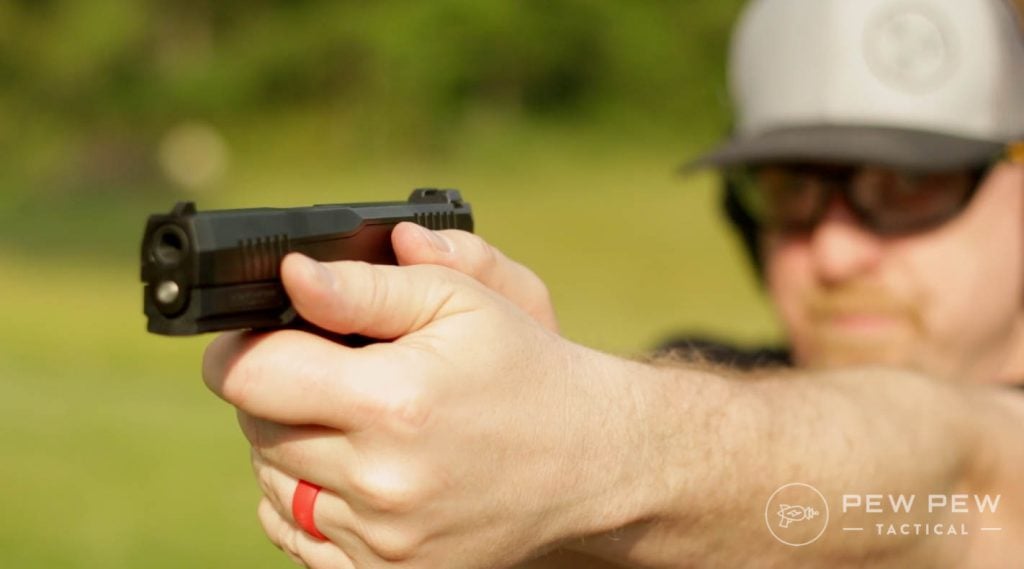
Learn how to shoot more accurately with your pistol/handgun through:
- Review of fundamentals
- Easy to do exercises at home
- Proper range practice tips
- Helpful gear
All with tons of pictures and videos. Some of which will include what NOT to do.
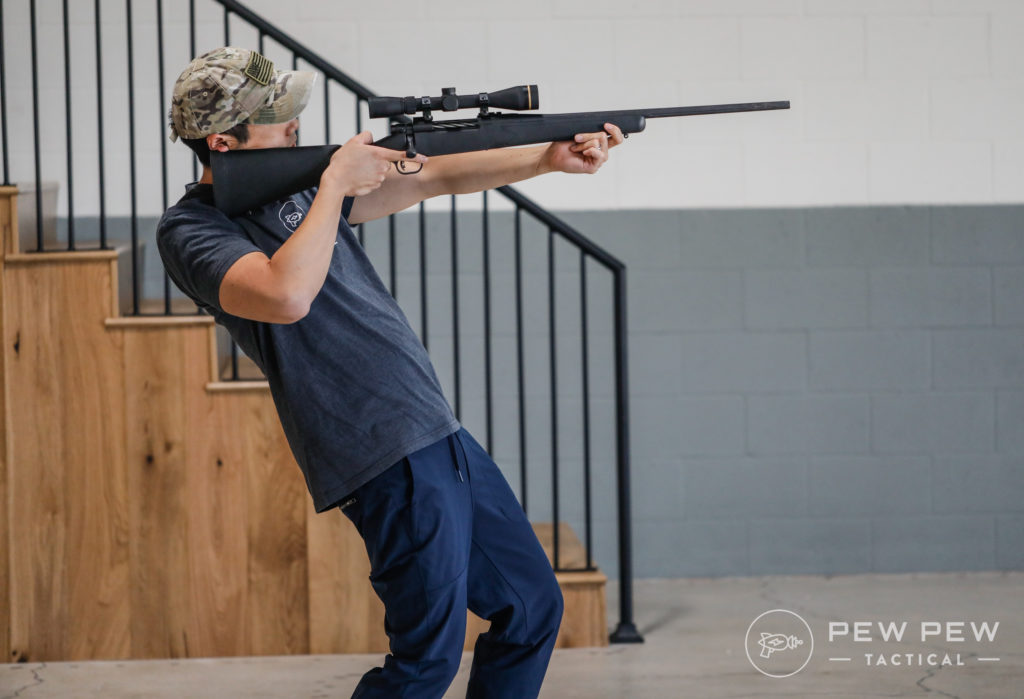
We also cover everything in our video Beginner Handgun Course…perfect if you’re completely new or have no formal training and want more hand-holding.
Table of Contents
Loading…
Introduction
If you’re here, you probably realize that…shooting pistols is actually pretty hard!
At the beginning of my shooting experience, I had a lot of sympathy with the Stormtroopers missing everything too. At least they had the excuse of a stressful situation!
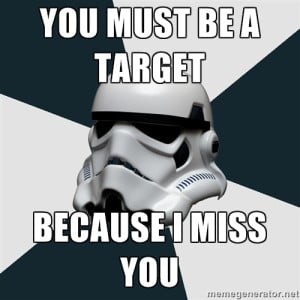
Now I’m not some professional competitive shooter, but take that as a positive…I still remember how it felt when I couldn’t hit anything and the differences each tip/exercise made in my development.
It’s going to take you a while, but let’s get started in making you a more accurate pistol shot beginning with fundamentals.
Shooting Stance
Some of you might scoff at the idea that how you stand has anything to do with how you shoot.
But think of it as the foundation of everything.
If you have a wobbly base, chances are it doesn’t take much to mess up whatever is on top. And loud explosions and recoil have a way of messing stuff up.
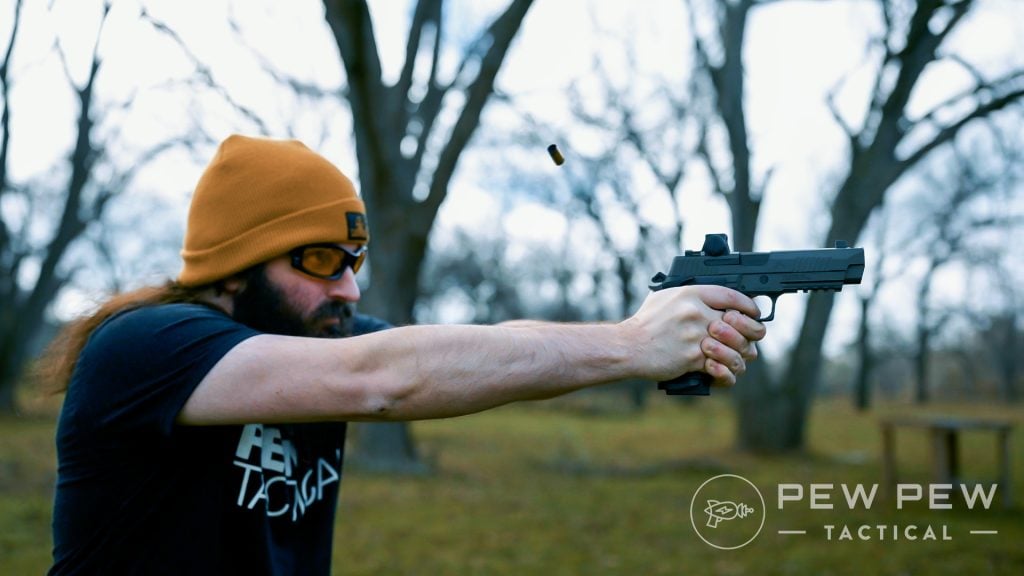
The main thing is to have a stable/comfortable stance that tilts you a little forward to manage recoil. Don’t worry if you’ve done that newbie lean (back), we’ve all been there.
Now’s the time to correct it, though!
If you want to get more technical, there are the three main types of stances: Isosceles, Weaver, and Modified Weaver (Chapman).
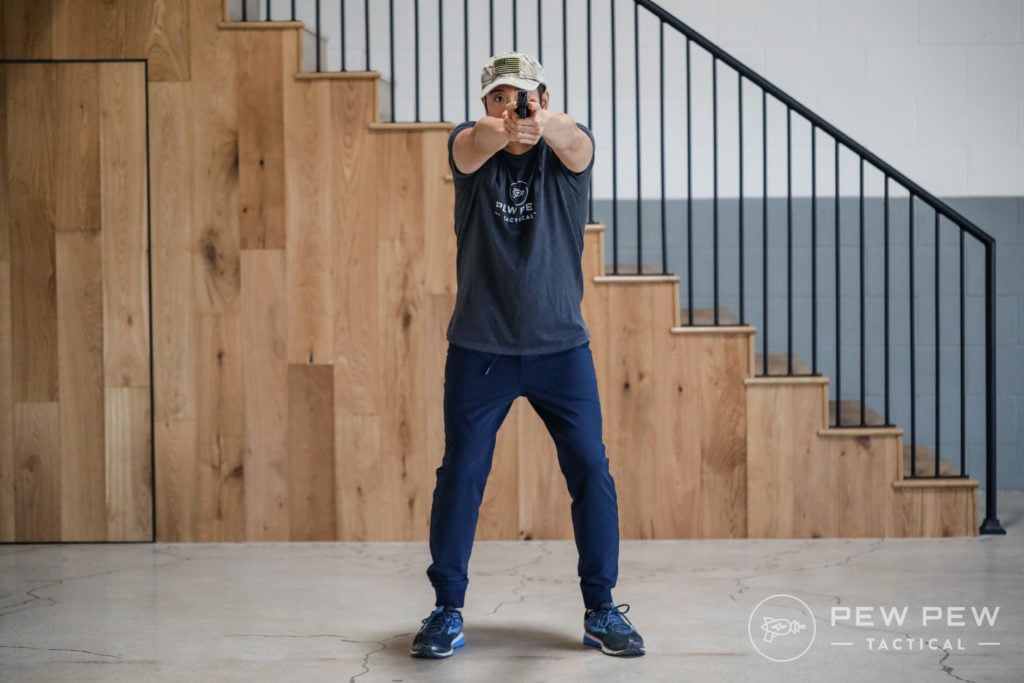
These are just variations on foot placement and which arm is flexed a little more. But take a look the picture below and see just how stable I look. Also, notice the slight lean forward.
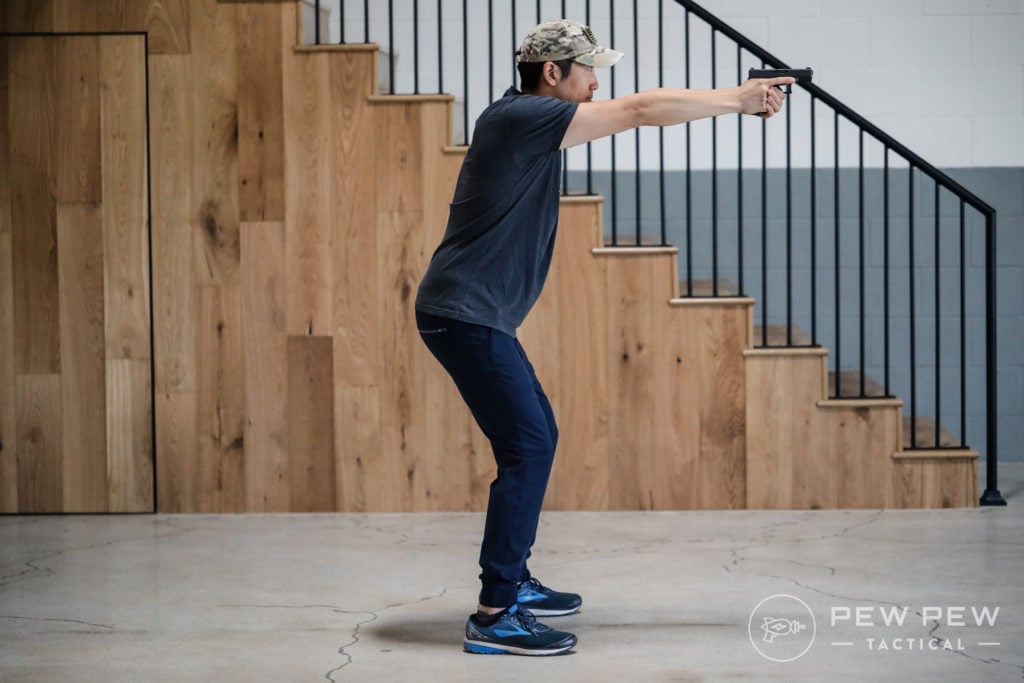
Can you guess why it’s call Isosceles? Thanks high school trigonometry class!
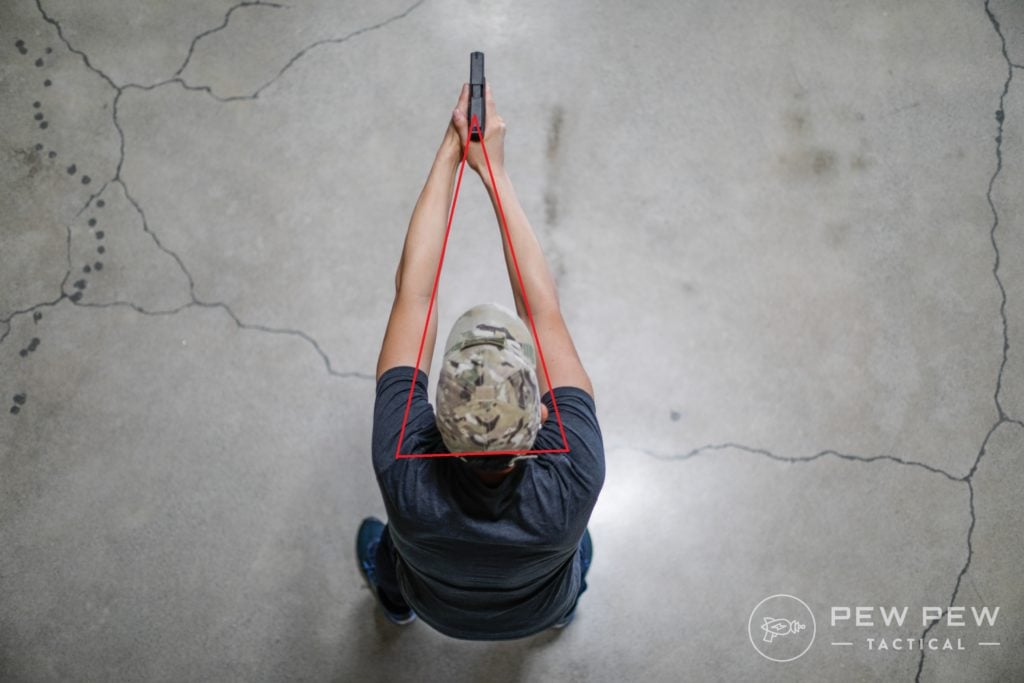
My previous favorite (Chapman) is geared towards right handed but left-eye dominant shooters.
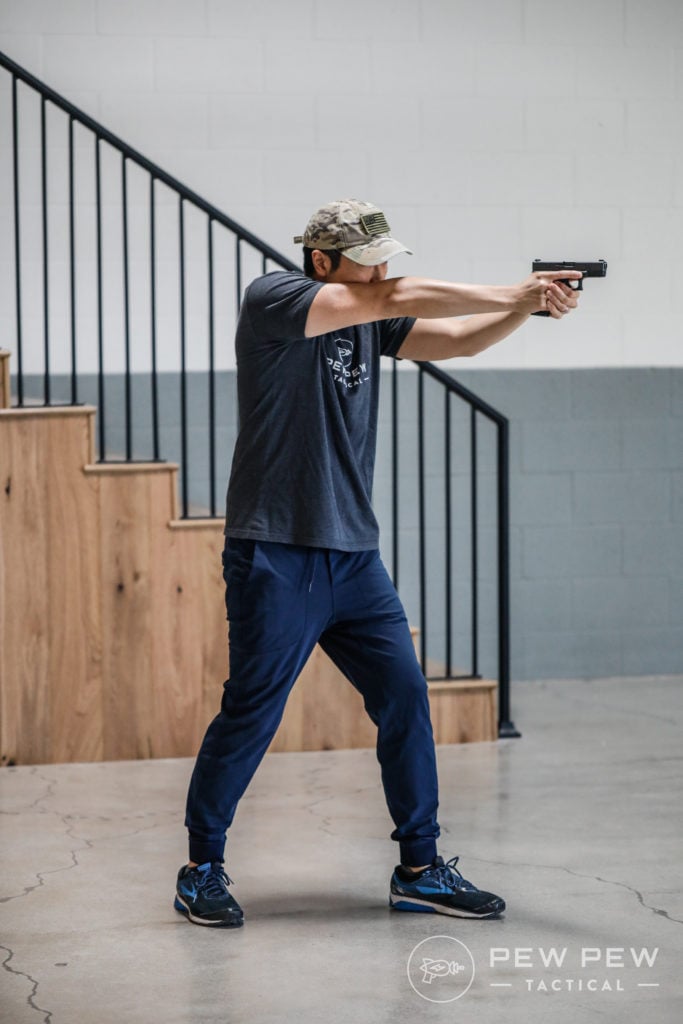
Ultimately, choose what feels most comfortable for you…but I go through all three stances more in-depth in our Stances article.
Handgun Grip
The first piece of advice I received about handgun grip was from the salesman at my local gun shop. He asked me to grip his hand with the same strength I planned on griping my future 1911.
I gave him a nice firm handshake while he proceeded to crush my hand.
A dick move, but a great lesson to have a very firm grip on your gun.
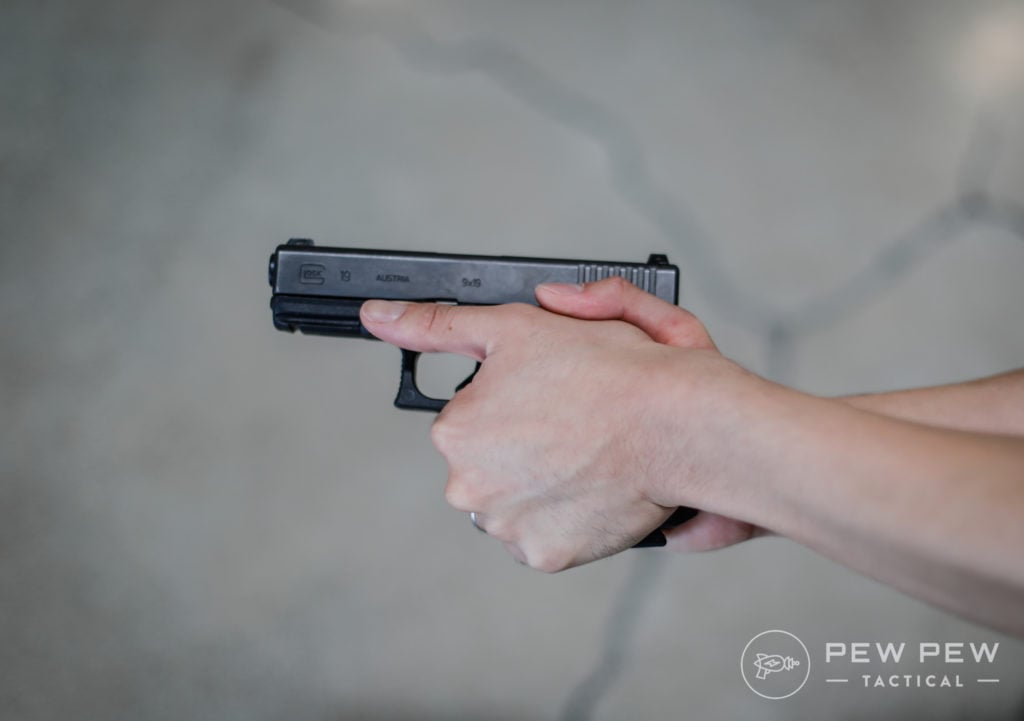
And how you hold the gun also has a huge effect on your accuracy.
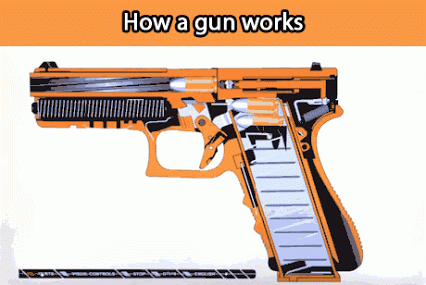
You want the web between your trigger finger and thumb to rest as high as possible on the grip. This helps contain the recoil of the slide moving back and forth.
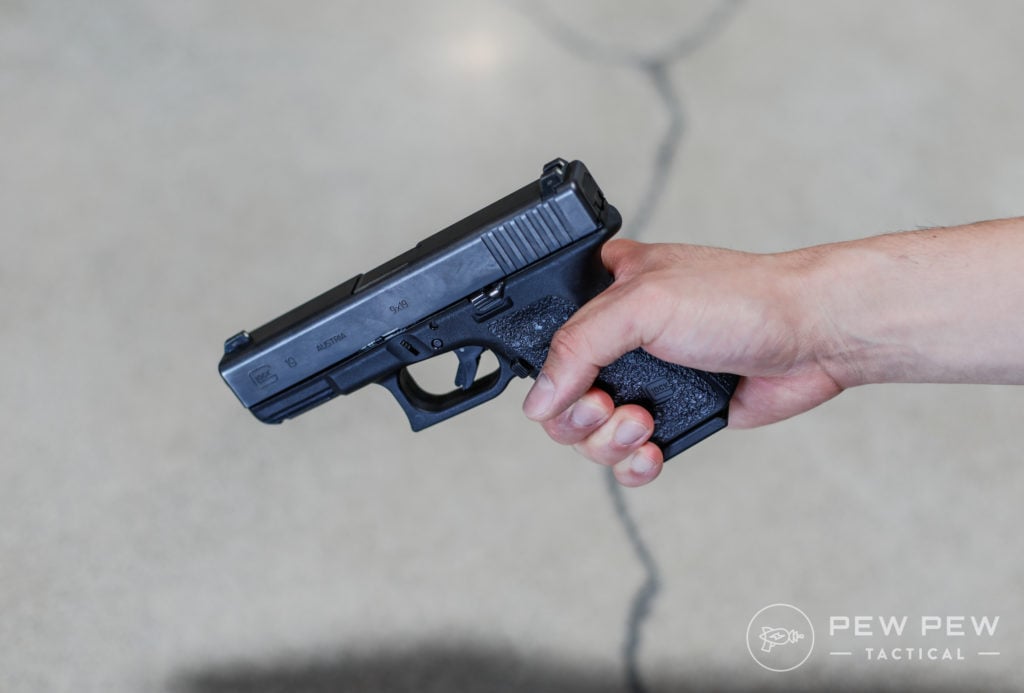
A low grip would cause the gun to do a lot more flipping. So, you’ll want to almost jam your hand/web into the backstrap to get a high grip.
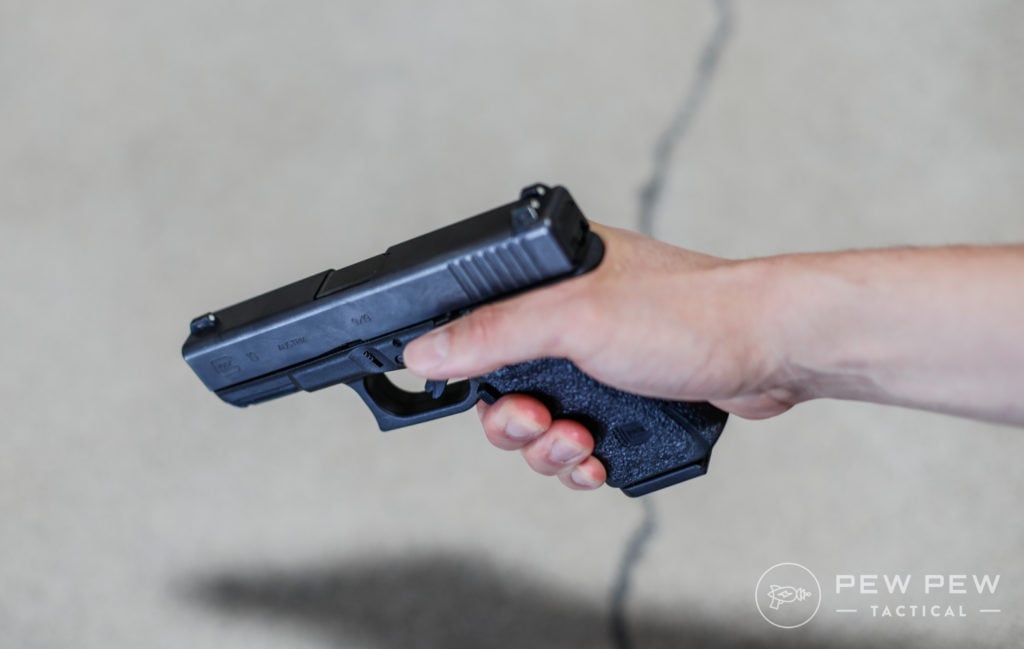
And because there’s this piece of metal moving back and forth, you want your forearm in line with the gun to absorb more recoil.
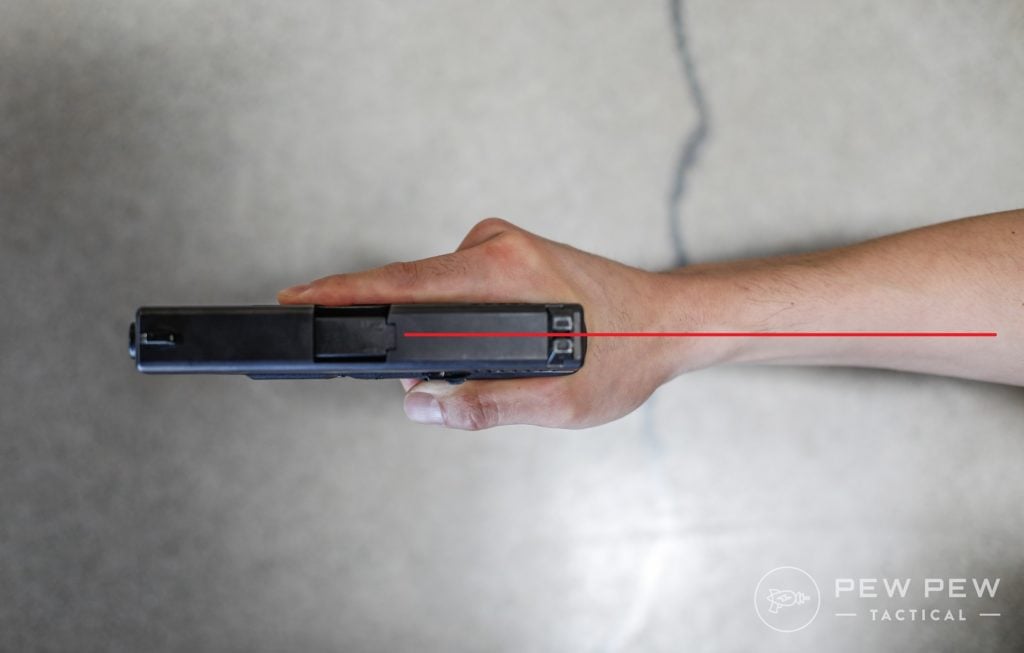
You’ll be tempted to first hold it at a slight angle since it feels more natural…but resist!
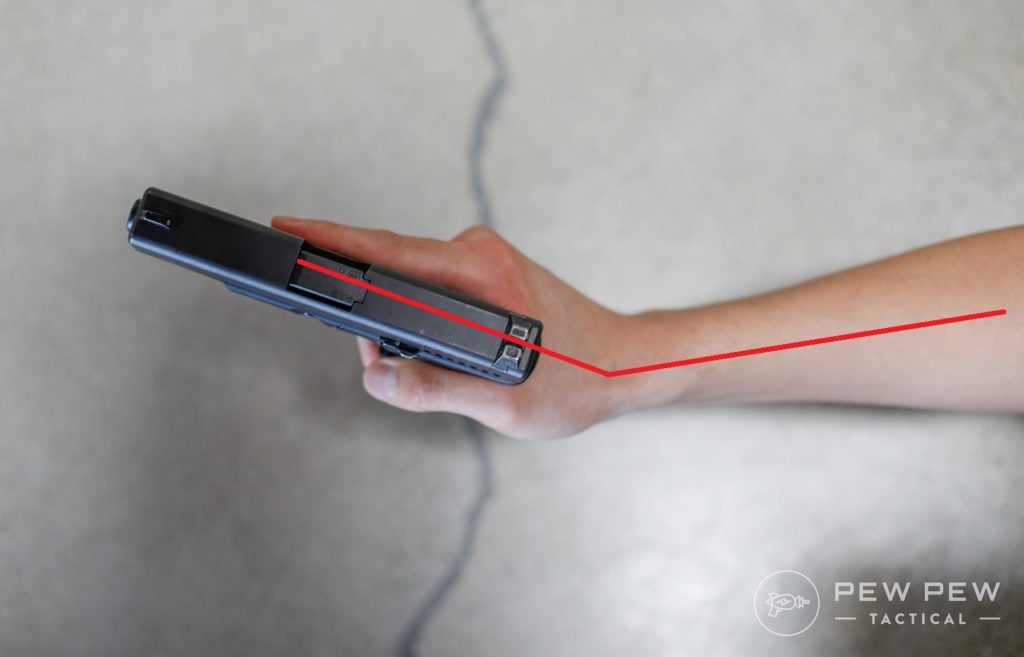
Now that you’ve got your shooting hand grip correct, let’s take a look at the empty space for your non-dominant hand.
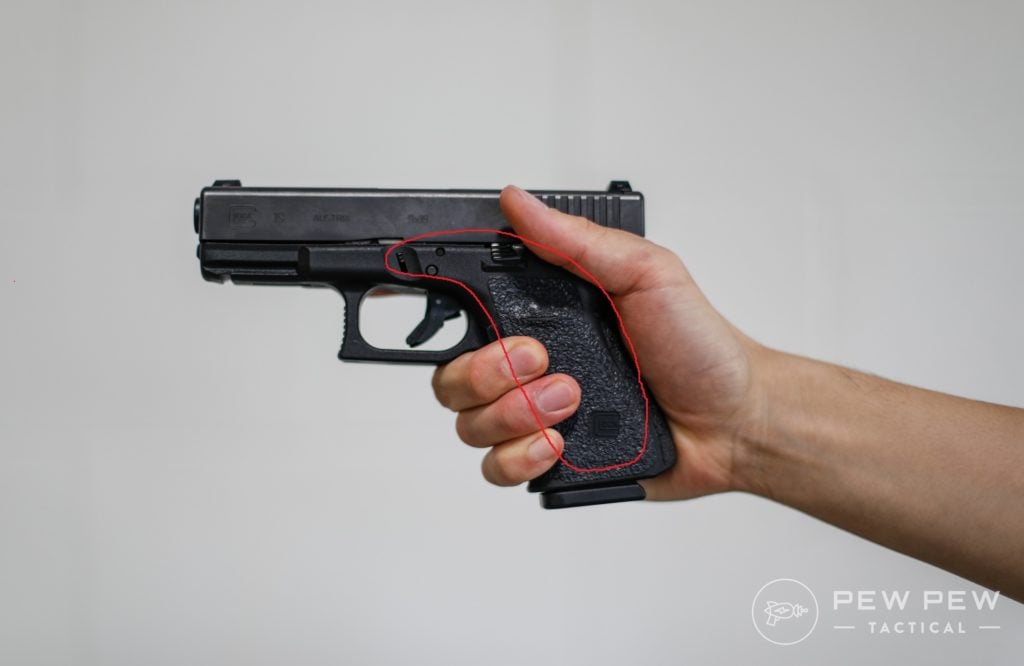
You want to fill it completely up with the other hand so you maximize grip. I like to double-check by making sure there’s a 45-degree angle between my left hand and the handgun slide.
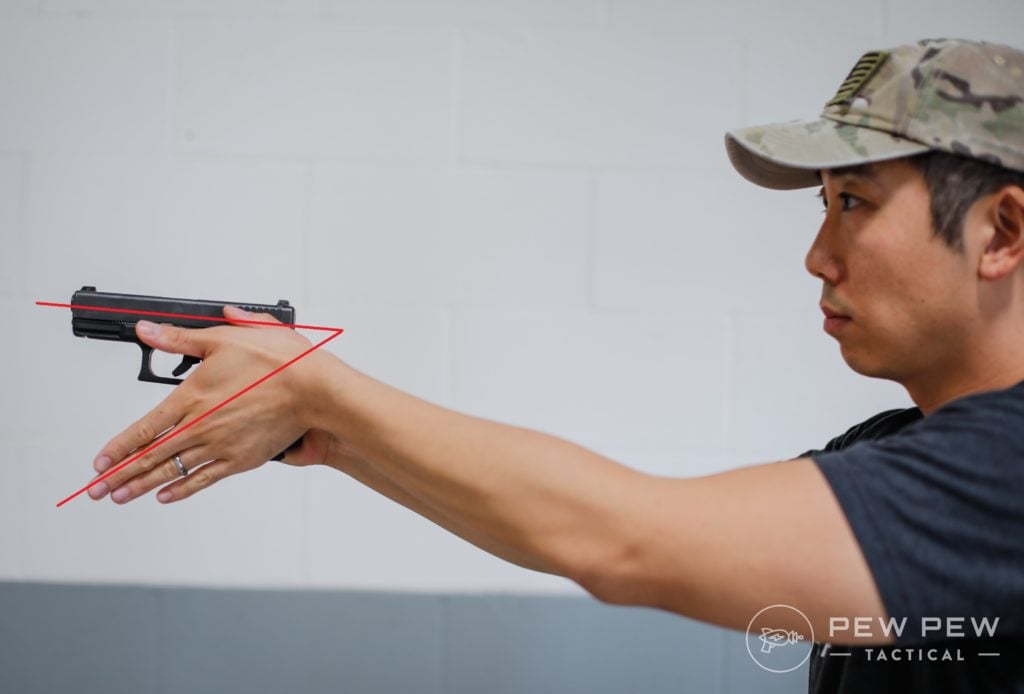
Thumb placement of your dominant hand is personal preference.
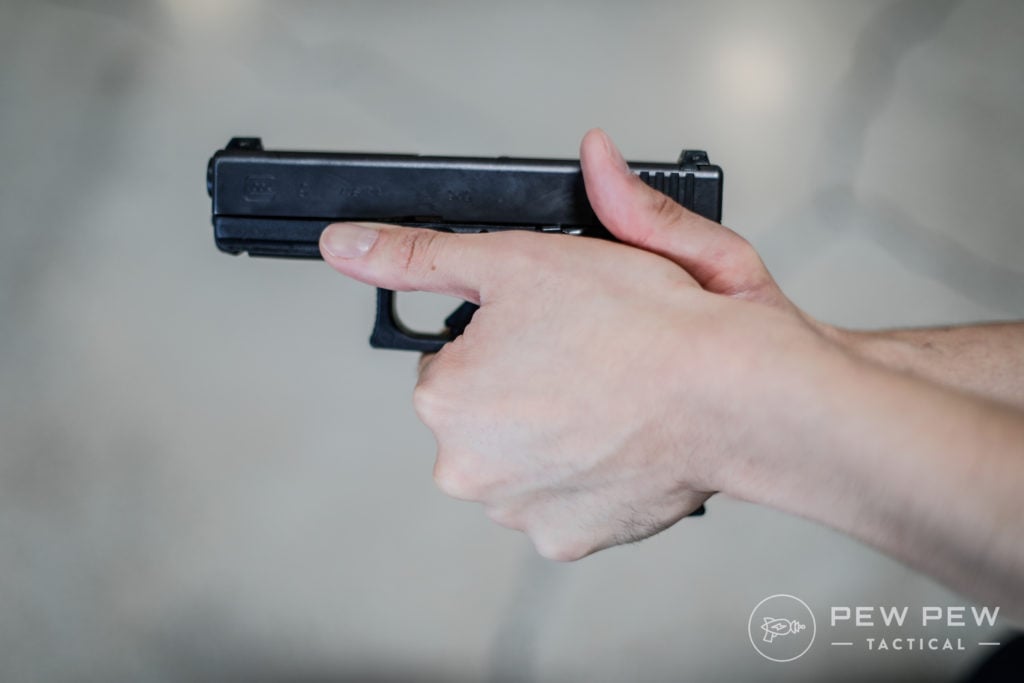
You’ll see both up in the air or pointed towards the target.

Experiment to see what you like or just go with what feels more natural. The non-dominant thumb will run along the frame.
If you’re running a 1911 or something else with a manual safety…
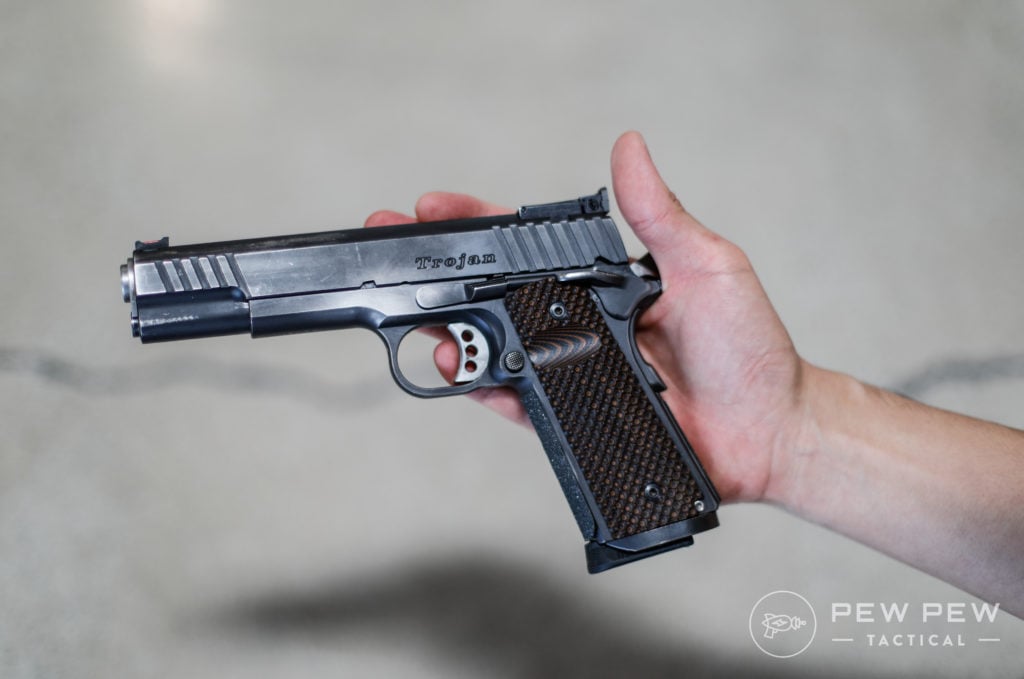
I like to rest my right thumb on it, since it was already there when I disengaged the safety.
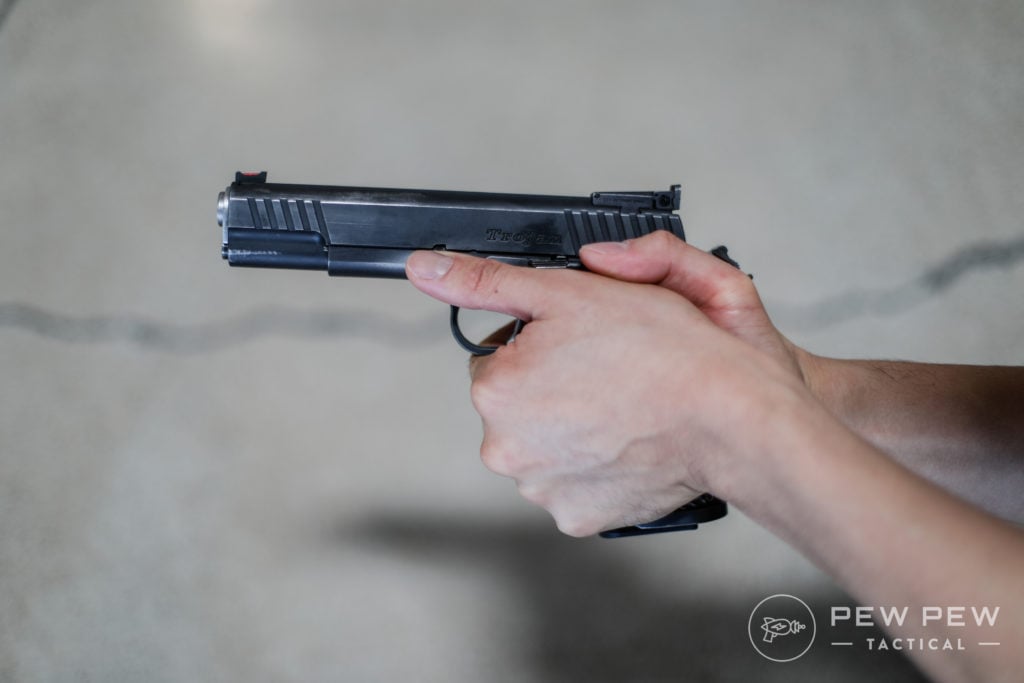
And although it might feel a little weird at first, I like to set my wrist at an angle when I punch out both my arms.
This keeps everything steady and helps prevent limp wristing…floppy wrists that don’t allow proper ejection and loading of the next round.
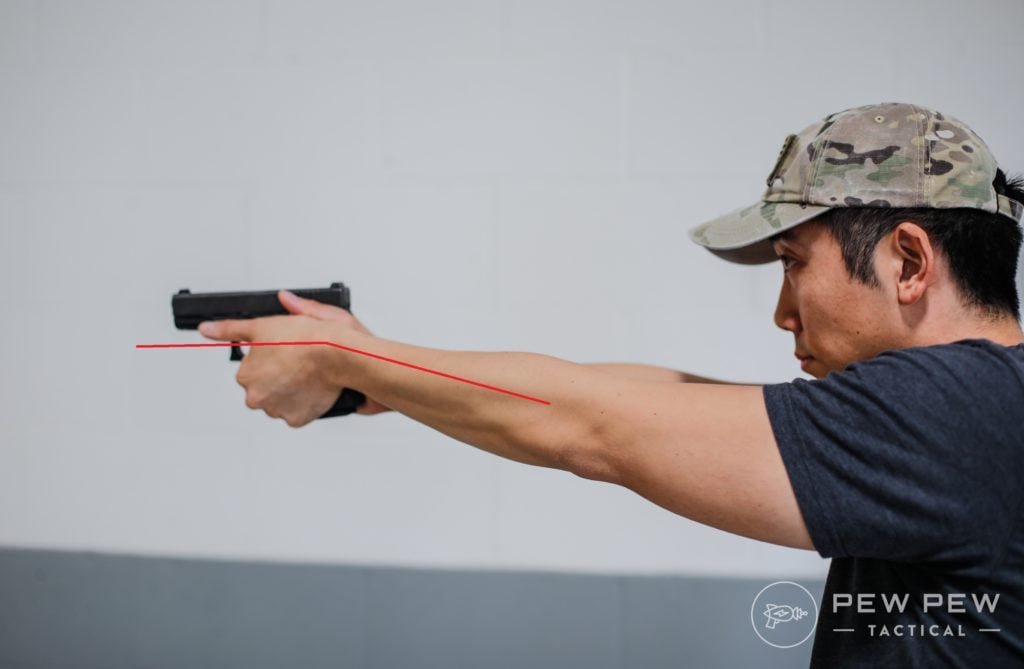
I’m now an advocate of gripping as hard as you can…but not so much that you have tremors. I’ve found that a crushing grip on the gun reduces the movement of your non-trigger-fingers, which is a good thing.
I like to think of my hands as a clamp, with the fingers as the point of rotation bringing in the palms of my hands hard into the gun.
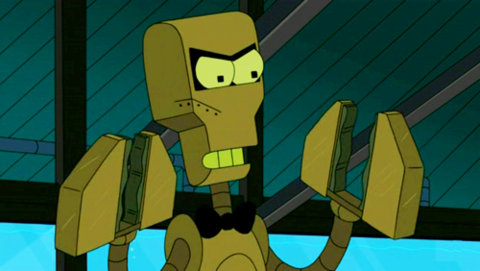
Want to learn more about grip? We cover revolvers and semi-auto grips in more detail in How to Grip a Pistol.
Sight Picture
You’ve probably heard it before…focus on the front sight!
Well, it really does help. In the beginning, I squinted hard and struggled to focus with just one eye open on the target.
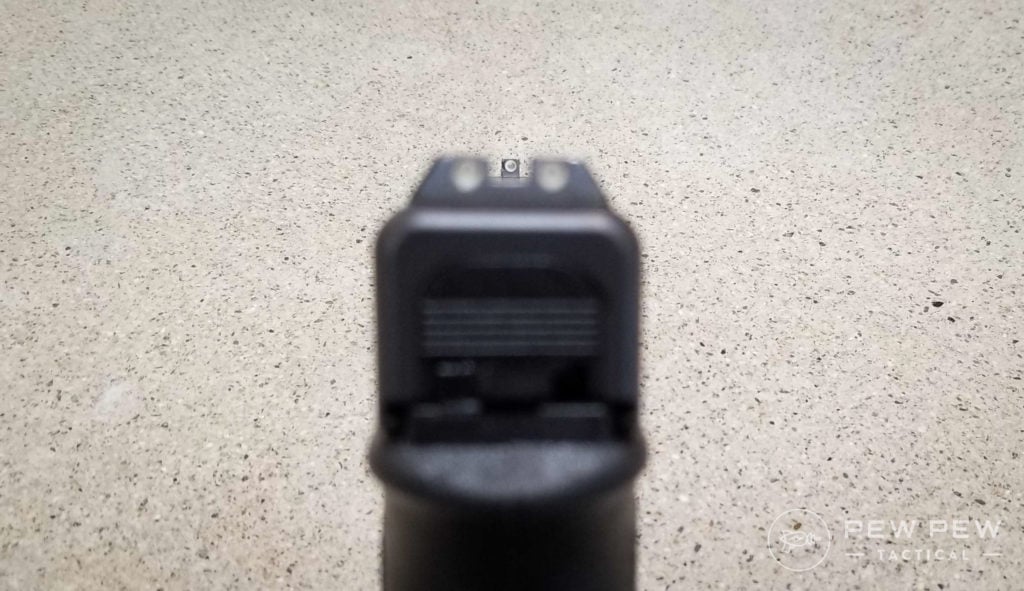
Remember that you want to match the top of the front sight with the top of the rear sight.
The top and middle of the front post is where your rounds should end up…not the actual front dot.
Same for fiber optic sights…
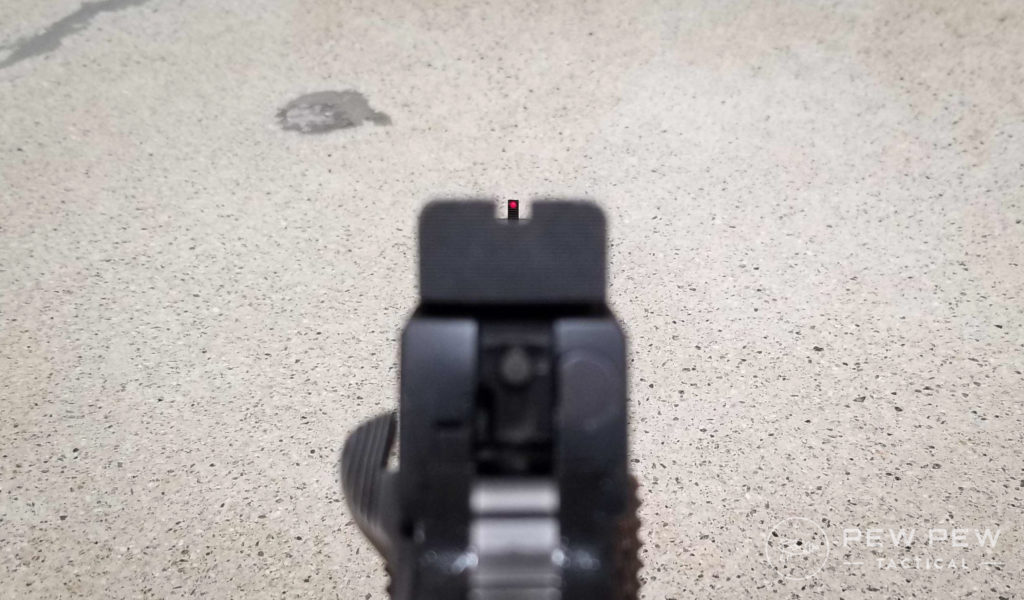
And more standard iron sights.
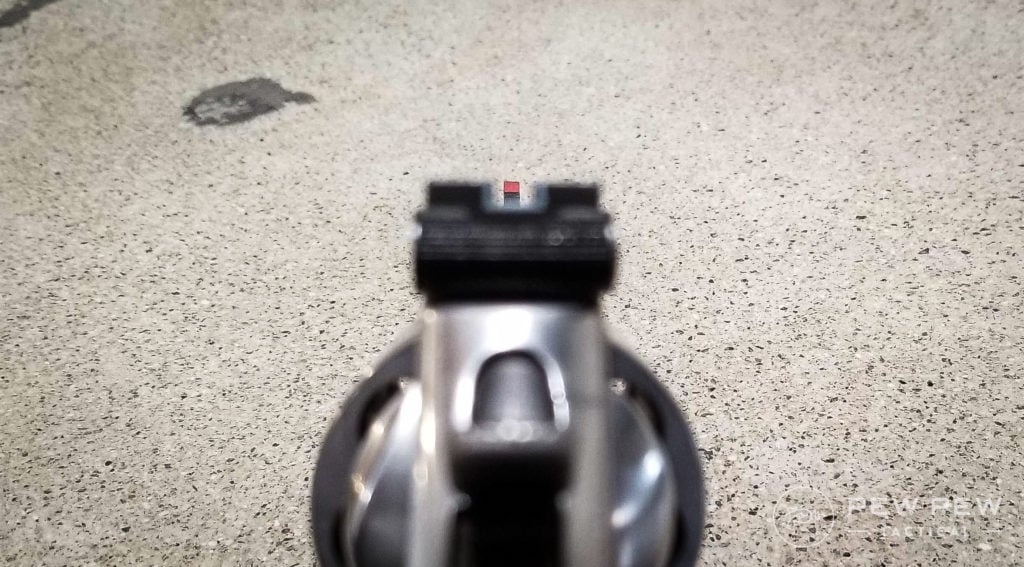
I’ve found it immensely helpful to keep both eyes open.
It will be very difficult at first depending on how long you’ve been shooting with one eye open. But once you master it, it makes everything so much faster with less eye fatigue.
And now you get more situational awareness.
First thing is to figure out which eye is dominant.
If you’re like me, you’ll be seeing some double-vision because both eyes are open.
I’ve found adjusting your sights closer to your dominant eye (left to right, not closing the distance to your face) makes it a lot easier to figure out which image to use.
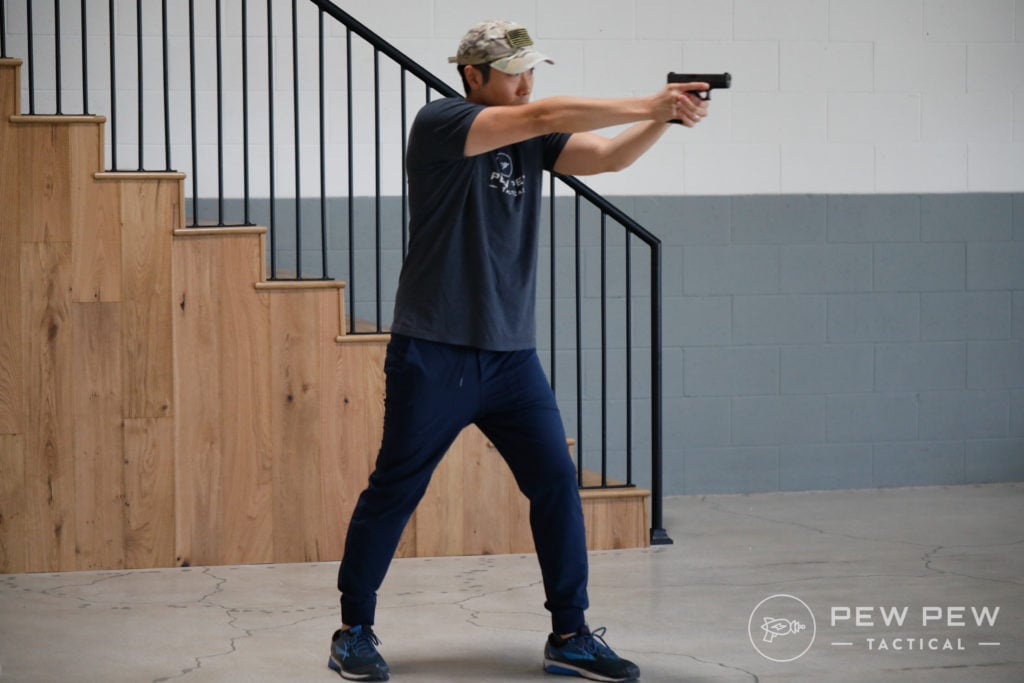
This might be just a little shift if you’re using Isosceles, or it might already be perfect with Weaver.
Since I’m left-eye dominant but right-hand dominant, I like the Chapman stance as it puts the sights more in line with my left eye.

However, if you made the move to pistol red dots like I have…Isosceles is pretty great again.
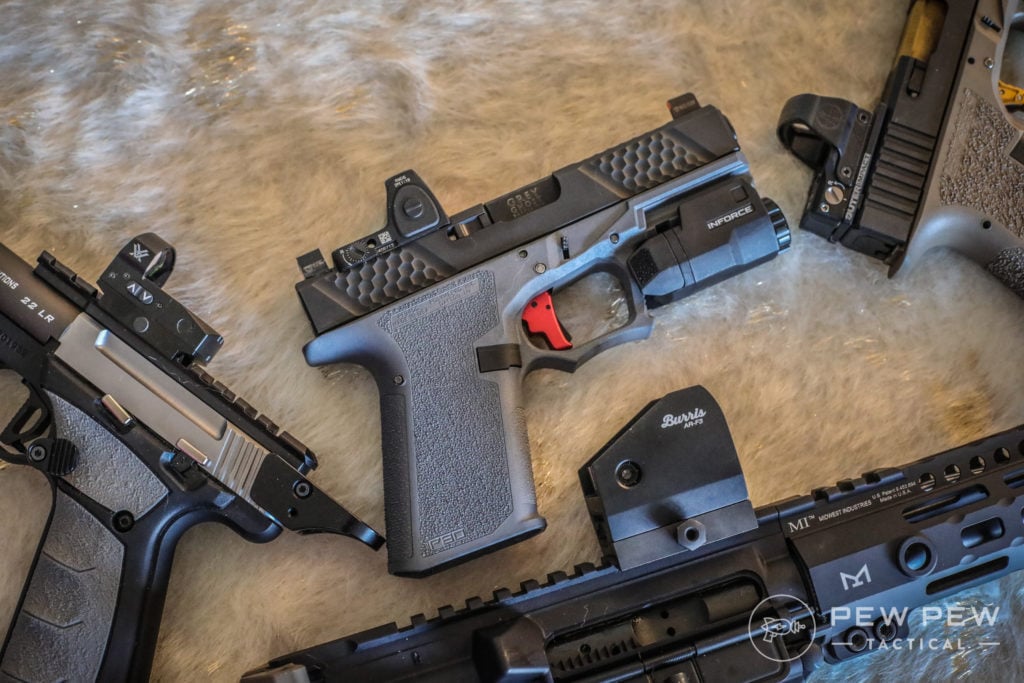
Trigger Pull
Might be the most important part of everything, and what dry-firing practice is all about below.
The best advice is to squeeze super slowly that you’re almost surprised when the shot breaks.
You’re not yanking on it since that will result in jerking the trigger and sending the shot off. The slower you pull the better your shot will be.
How about where to place your trigger finger?
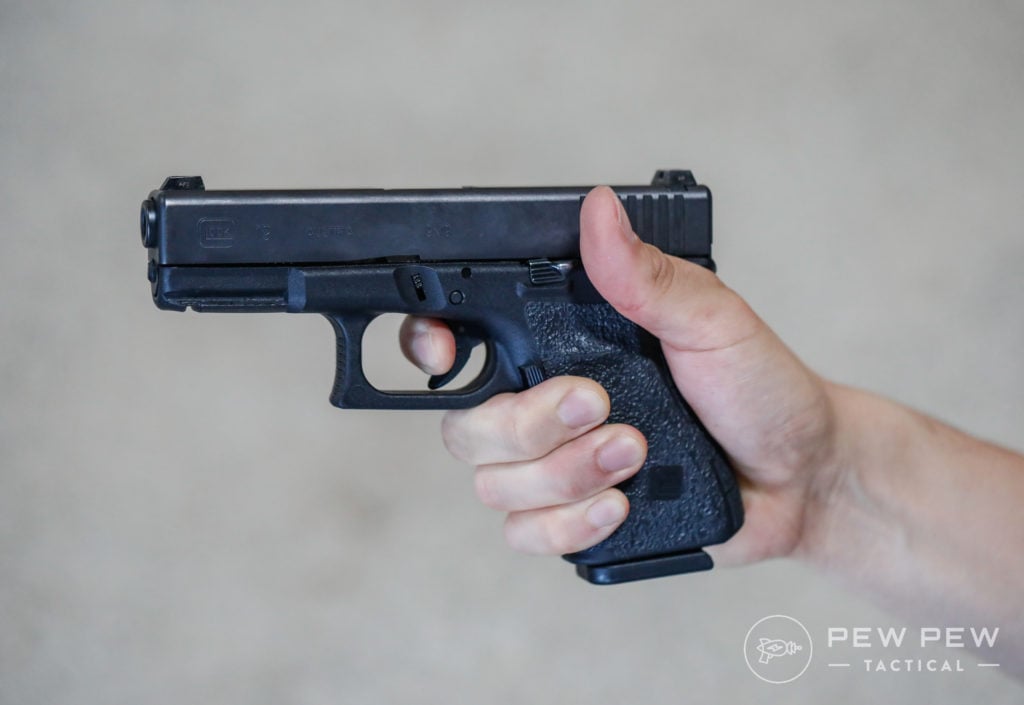
It’s a personal preference and something to do with your finger length too. But I would suggest somewhere between the top quarter of your fingertip to before the first joint crease.
Keep in mind that the ideal pull would be completely straight back with nothing else moving except the first two joints of your trigger finger. Take a look at your gun and fingers to see what looks/feels the best.
I find that I shoot better when I’m closer to the first joint. This length gives me good leverage and isolates the third section of my trigger finger (closest to hand) so only the first two joints are moving.
Less is more here!
Breathing
One thing I always forget to do when I’m shooting.
Holding in your breath messes you up after a while and so I just try to breath naturally.
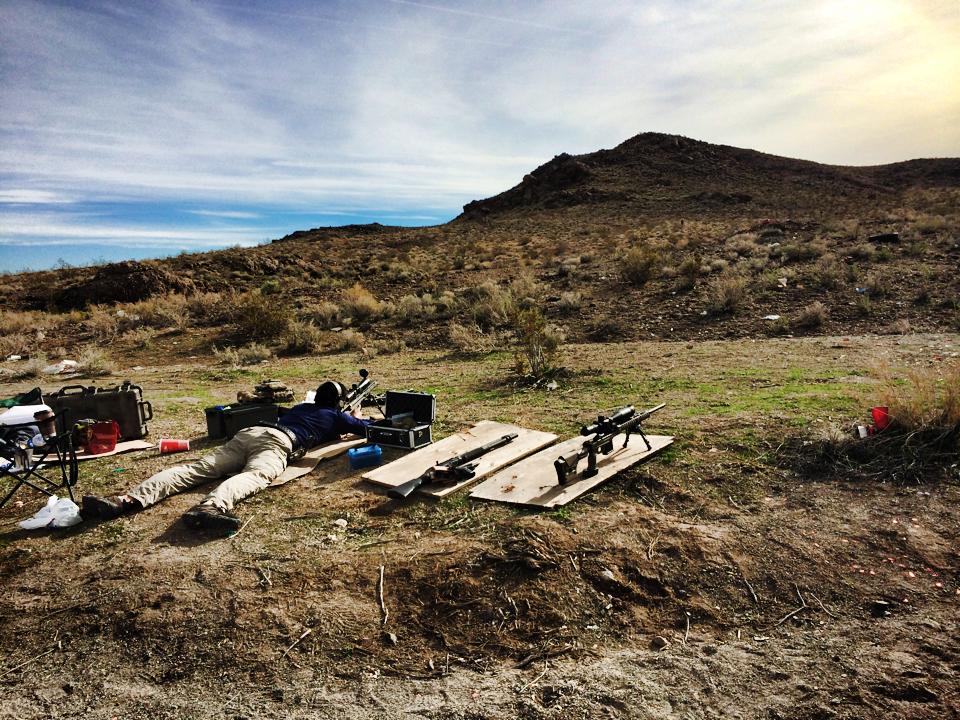
You’re pistol shooting, not sniping 1,000-yards, so you don’t have to plan your breaths (and heartbeats).
Trigger Reset
An easy mistake is to immediately lift your finger off the trigger after each shot and look at the target.
But trust me, the hole will always be there so take your time.
Whenever you lift your finger off quickly, you’re likely shooting too fast and jerking the trigger, or introducing excess movement to the gun.
You’re also making it harder for yourself the next shot since you’ll have to pull the first part of the trigger again (also known as the slack).
Proper trigger reset is:
- Holding the trigger all the way at the end until after the shot breaks.
- Releasing it only until the point it resets (you’ll feel or hear the click).
- If you’re firing again, start at the reset point — not all the way at the beginning of the trigger pull.
Dry-Firing Practice
What is Dry Firing?
Dry firing is pulling the trigger on a cocked gun and allowing the hammer/striker to drop on an empty chamber or dummy round.
It’s probably the most effective way of improving pistol accuracy. And you can do it at home!
Is Dry Firing Safe for My Gun?
If your handgun/pistol shoots centerfire rounds (9mm, .40 S&W, .45 ACP, etc) instead of rimfire rounds (such as .22 LR), then you can dry fire all you want since the firing pin is not actually hitting anything.
Rimfire firing pins hit the mouth of the chamber when there’s no cartridge, so you should practice with snap caps that take the hit.
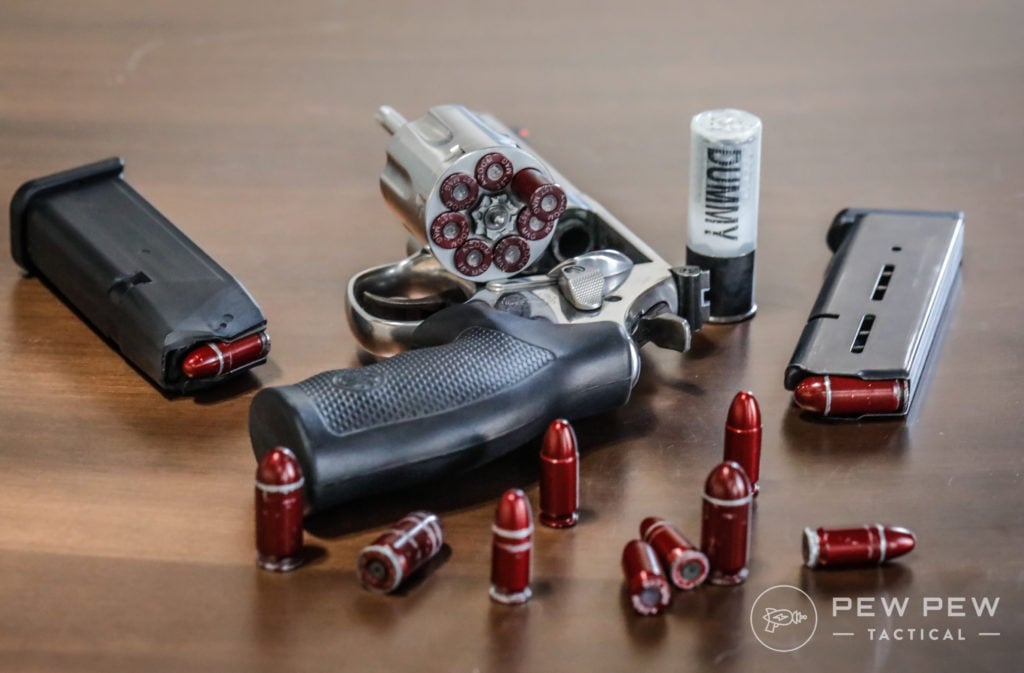
Still…my advice is to consult your owner’s manual to double-check.
Prices accurate at time of writing
Prices accurate at time of writing
-
25% off all OAKLEY products - OAKLEY25
Copied! Visit Merchant
There are a lot of snap caps and dummy rounds on the market, so be sure to take a look at the Best Dummy Rounds & Snap Caps For Dry-Fire Practice!
Why Dry Firing?
The main point of dry fire practice is to develop muscle memory so you consistently produce an awesome trigger pull and don’t flinch when it’s time for real shooting.
And if you’ve developed some bad habits along the way, it does a great job of rewiring you back over time.
At least for me, I find that after a week or two of dry firing a few minutes a day, I become “one” with my trigger and grip.
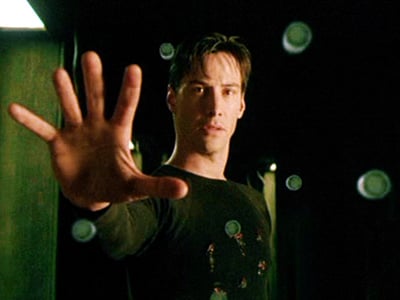
My grip just feels right, and I can sense all the little nuances in the trigger pull. And when I focus on the front sight and pull the trigger, the front sight stays super steady.
It takes a lot of practice (and perfect practice) to reach that point. And it’s a diminishing skill that needs to be kept up to date too. Even after just a few days of not practicing, I can feel some differences the next time I dry fire or shoot.
Best Way to Dry Fire
First, always make sure your gun is unloaded and follow the 4 Rules of Safety.
- Guns are always loaded (treat them as such and don’t have live ammo in the room).
- Never let the muzzle cover anything you don’t want to destroy (point it in a safe direction).
- Keep your fingers off the trigger until you’re ready to shoot.
- Be aware of your target and what is beyond.
I always check if my gun is empty every time I pick it up — even if it’s between strings of dry firing. It just gets you into a good habit.
I also like to set up targets or at least small things that are safe to “shoot,” as a light switch or doorknob.
I focus on the front sight (both eyes!) and remember to squeeze so slowly that I’m surprised when the gun clicks.

I sometimes actually say “squeeze” out loud to make sure I do it. Once you can do it slowly, you can speed it up a little, as long as the front sight still doesn’t move.
One great way, in the beginning, to make sure the sight doesn’t move is to physically place a small coin on top of the front sight during your exercise. If it doesn’t fall off, you’re probably doing a great job.
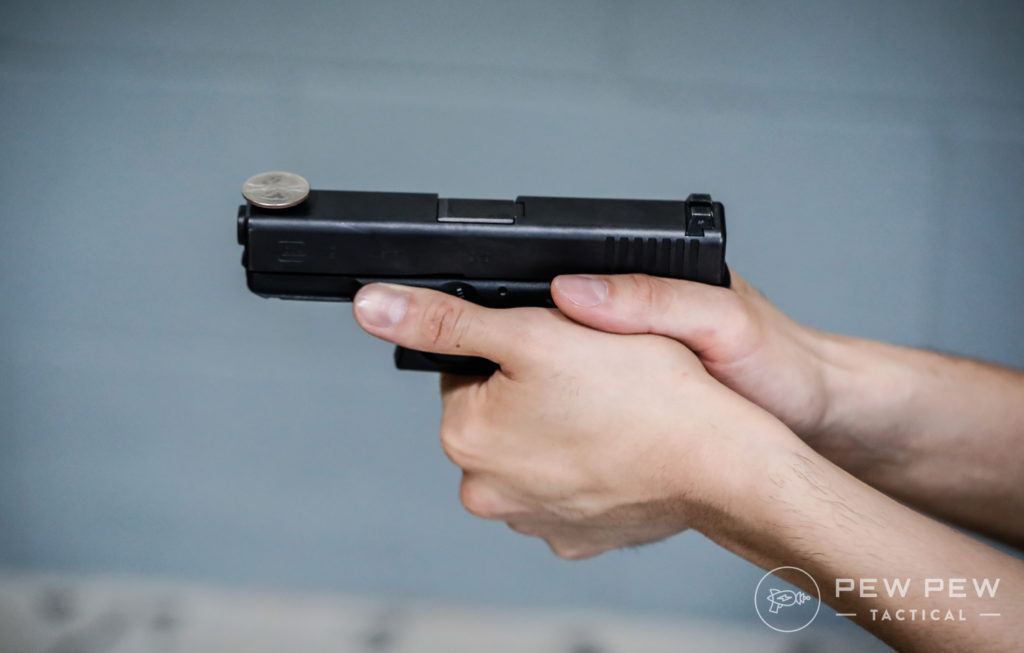
Finally, remember to practice both full trigger pulls (with the slack) and trigger reset pulls. To do a trigger reset pull, leave your trigger finger depressed at the end of the first shot, and rack your slide with your non-dominant hand.
For some guns you don’t have to rack it all the way back, sometimes just a half-inch or so is enough. Get back into your two-handed grip, let the trigger reset (listen for the click), and shoot.
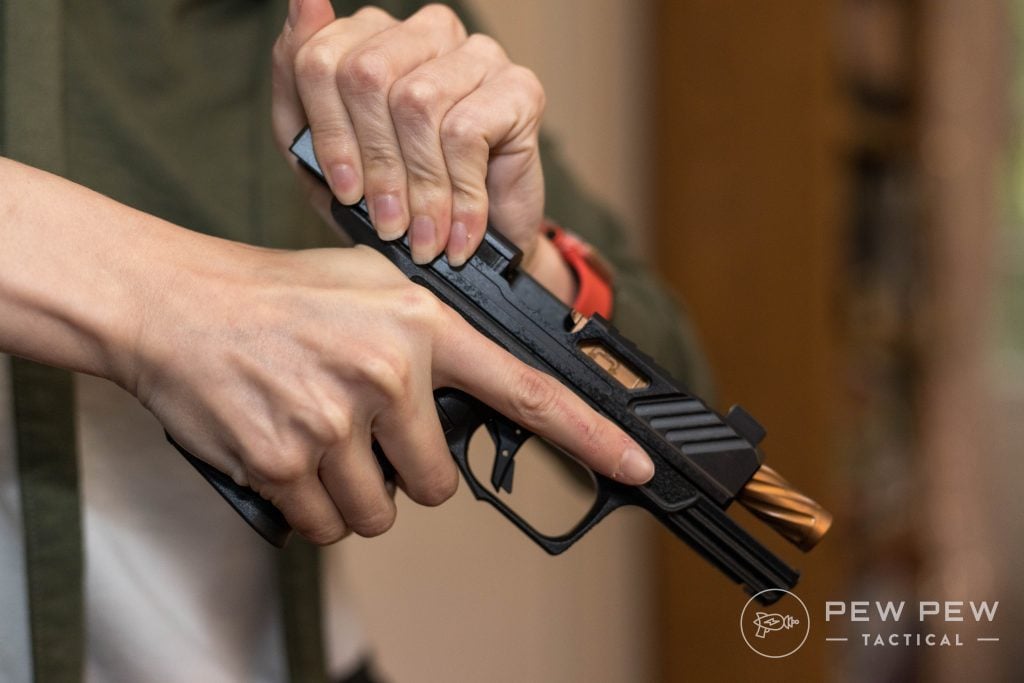
For the longest time, I only practiced full trigger pulls and got great at those. But, when I had follow-up shots, I started jerking the trigger. You’ll likely be firing both ways so be prepared for anything!
Check out more in our Safe & Effective Dry-Fire Training article.
Range Practice
Too much range practice, in the beginning, is sometimes detrimental. That’s because you haven’t built up good muscle memory. Instead, you build up a flinch reaction.
Don’t worry if that’s you…with some quality dry-firing at home you can overcome it.
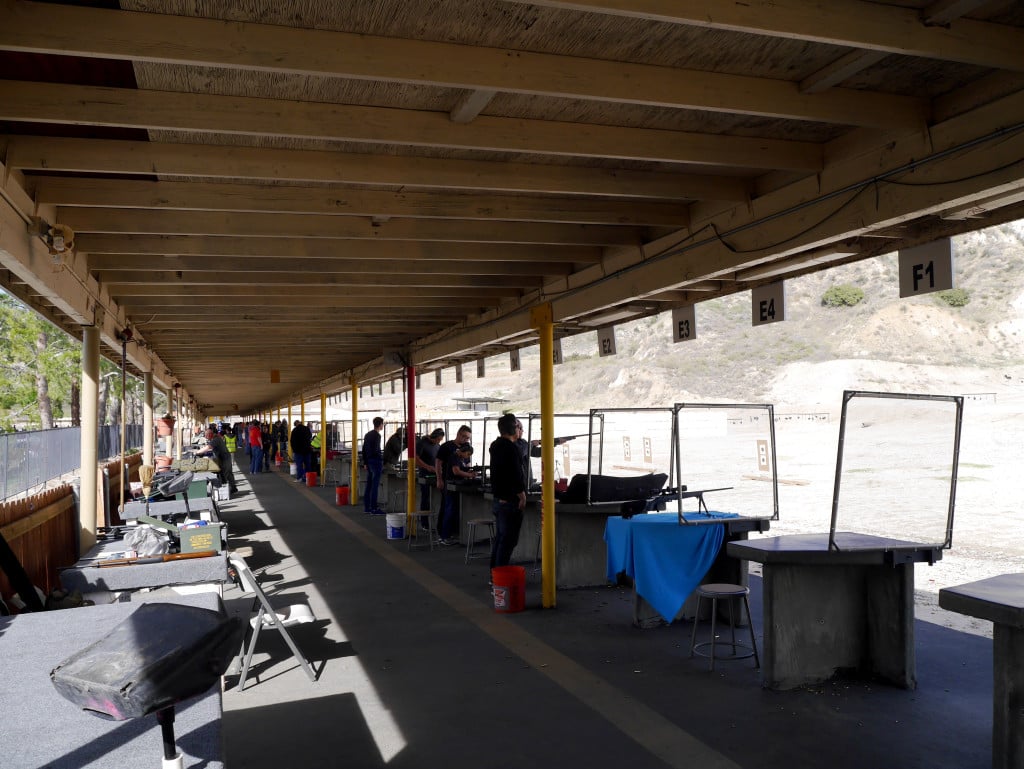
I like to always have some dry firing sessions at home in between range days. And when I get to the range, I always dry fire a couple of shots before loading up real ammo.
I start off at short distances since there might be a lot of effects that come into play at 25-yards (wind, ammo, etc) but it’s all me at 3- to 5-yards.
To learn more about zones and what shooting at different distances does in a defensive situation, check out the Brownells Daily Defense video below.
Sometimes if it’s a new gun or if I’m doing really poorly, I’ll start shooting with a supported position first to get some confidence and set a baseline accuracy.
You can do this by sitting down and placing your elbows on the bench, or leaning into the counter.
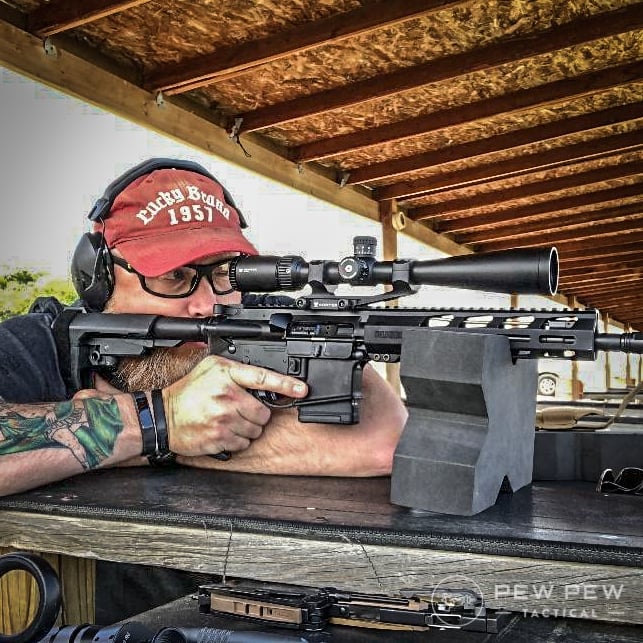
I also found this graphic to be immensely helpful in diagnosing my shooting errors.
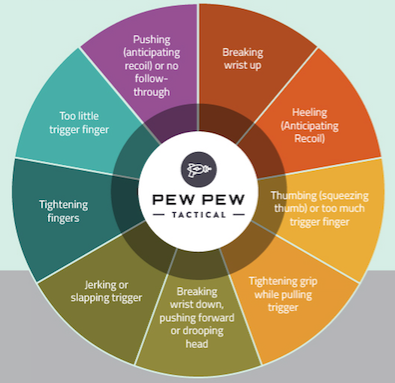
Have a target, shoot a couple shots at it, and see where they land in relation to the chart.
If you’re a lefty, you will have to mirror image the findings. And if there’s no overt grouping (your shots are all over the place), it’s likely your grip is not consistent.
I usually start off pretty strong and as I get more comfortable I forget some of my lessons, such as remembering to squeeze. That’s when I start telling myself “squeeze” every shot again.
Lastly, there’s a great drill to run once in a while if you have a buddy. Have them help you load a magazine with both live ammo and snap caps, so you don’t know what’s next in your stack.
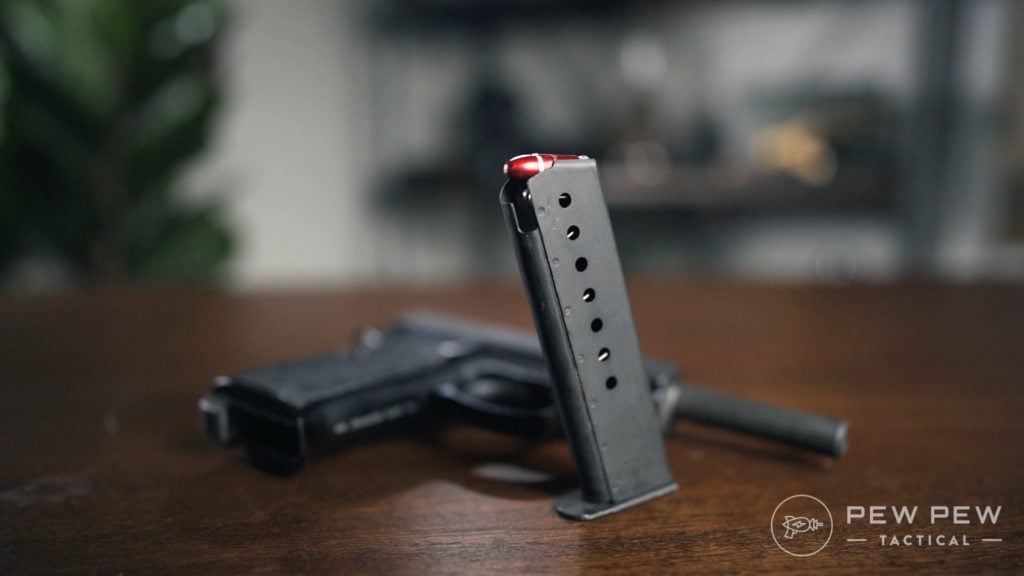
The point is to see if you have a natural flinch during shooting which will show up when you reach the snap caps. It’s a great visual moment to see how you actually deal with the recoil.
It’s one thing to be dry firing and shoot perfectly, but another once real recoil is entered into the equation. My own natural flinch was a pretty pronounced pull-down and to the left.
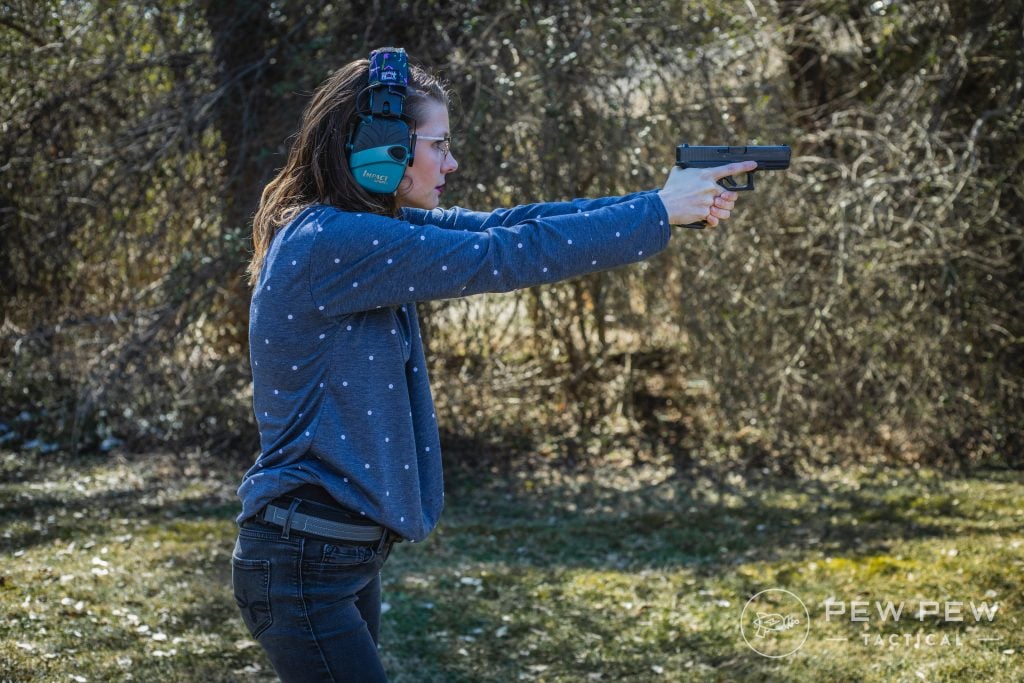
Check out our article on some of the best range training drills.
Shooting Gear
Here are some shooting gear and accessories that I’ve found to help me become a better pistol shot.
Snap Caps: Essential if you’re shooting rimfire such as .22LR, but also great for other calibers if you want to work on reloads in the future, or do the drill I just mentioned above.
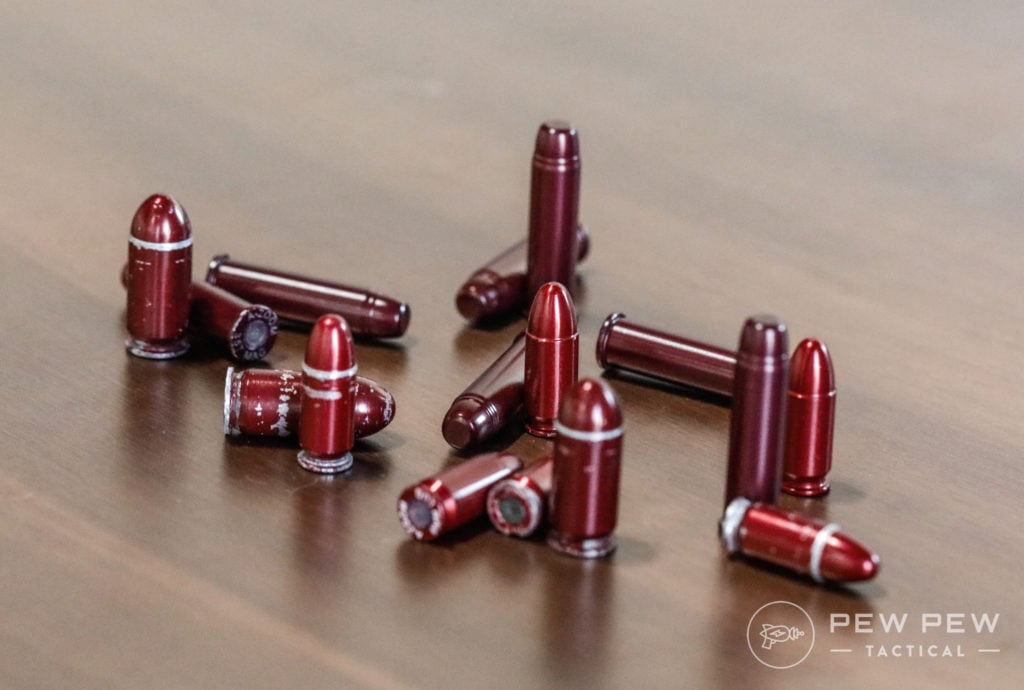
Prices accurate at time of writing
Prices accurate at time of writing
-
25% off all OAKLEY products - OAKLEY25
Copied! Visit Merchant
Laserlyte: Awesome tool to visually see where your shots hit. It’s a device that fits into your handgun as a dummy round but shoots a laser when the firing pin hits it. Pair it with randomized targets that detect the lasers to work on target transitions and future competitive shooting moves.
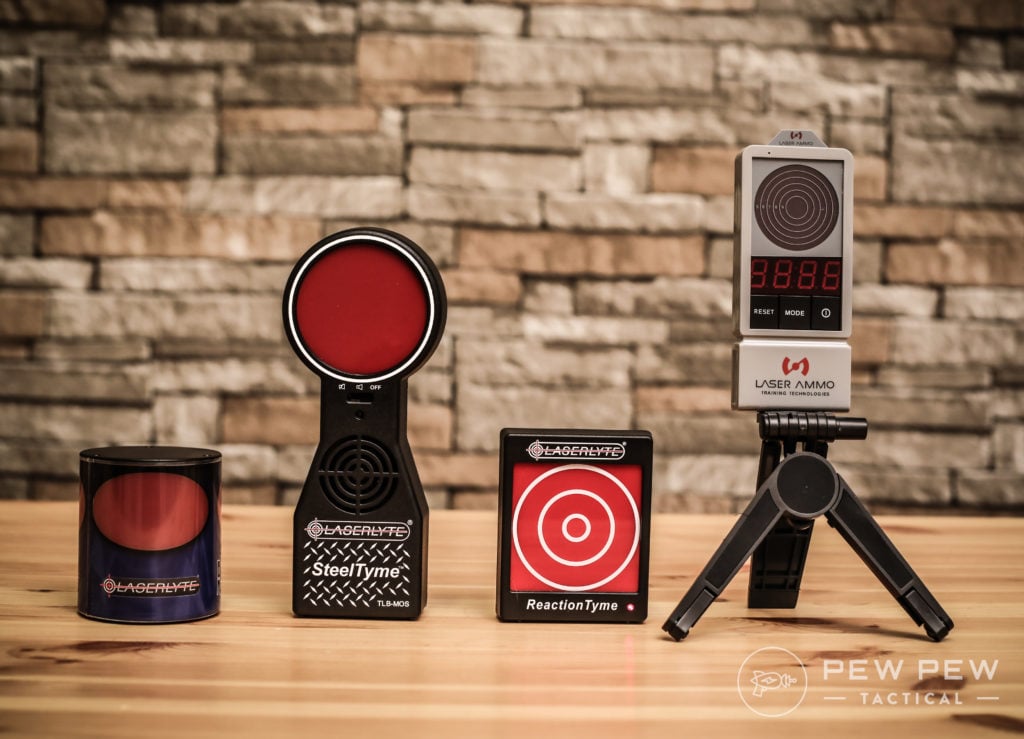
It’s also a great tool for getting non-shooters interested in going with you to the range! Kind of expensive but think of all the ammo you’ll save.
Find our complete roundup of the best Laser Cartridges and Targets.
Prices accurate at time of writing
Prices accurate at time of writing
-
25% off all OAKLEY products - OAKLEY25
Copied! Visit Merchant
Shoot N’ C: Sticker targets you can put on paper targets at the range which show a splash of color whenever you hit it.
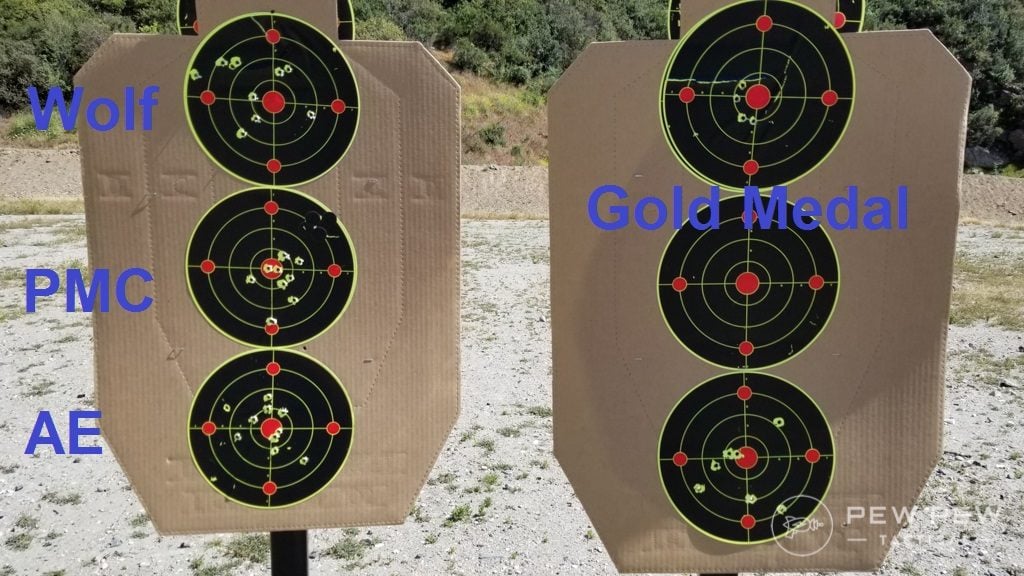
Makes it much easier to figure out where you’re shooting when the target is farther out.
Prices accurate at time of writing
Prices accurate at time of writing
-
25% off all OAKLEY products - OAKLEY25
Copied! Visit Merchant
Hand Strengtheners: I thought it was dumb to get these, but the harder grip you can get on your gun, the more you can manage recoil. Consider me a believer. Just get ready for literally every single person that sees them to try it out.
-
25% off all OAKLEY products - OAKLEY25
Copied! Visit Merchant
Talon Grips: Essentially sandpaper/rubber stickers that are cut for your specific gun. Drastically increases the amount of grip on your gun.
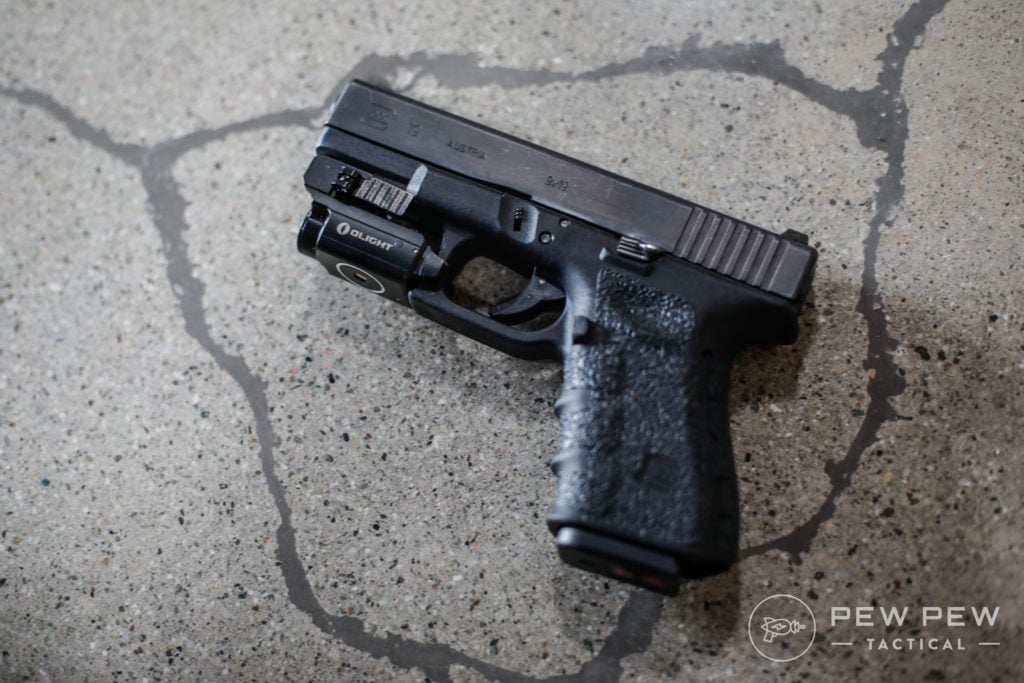
Or you can be really obsessed about grip like me and just stipple your polymer gun.
Prices accurate at time of writing
Prices accurate at time of writing
-
25% off all OAKLEY products - OAKLEY25
Copied! Visit Merchant
Dry Fire Training Cards: Simple idea but great for both beginners and advanced shooters. It gets boring sometimes to raise your gun and shoot at a target. Maybe it’s a little better with laser targets or a timer, but now you have a couple of dozen variations to choose from.
-
25% off all OAKLEY products - OAKLEY25
Copied! Visit Merchant
I’ve started training with my set so I’ll report back to see if I make it higher in the competition standings.
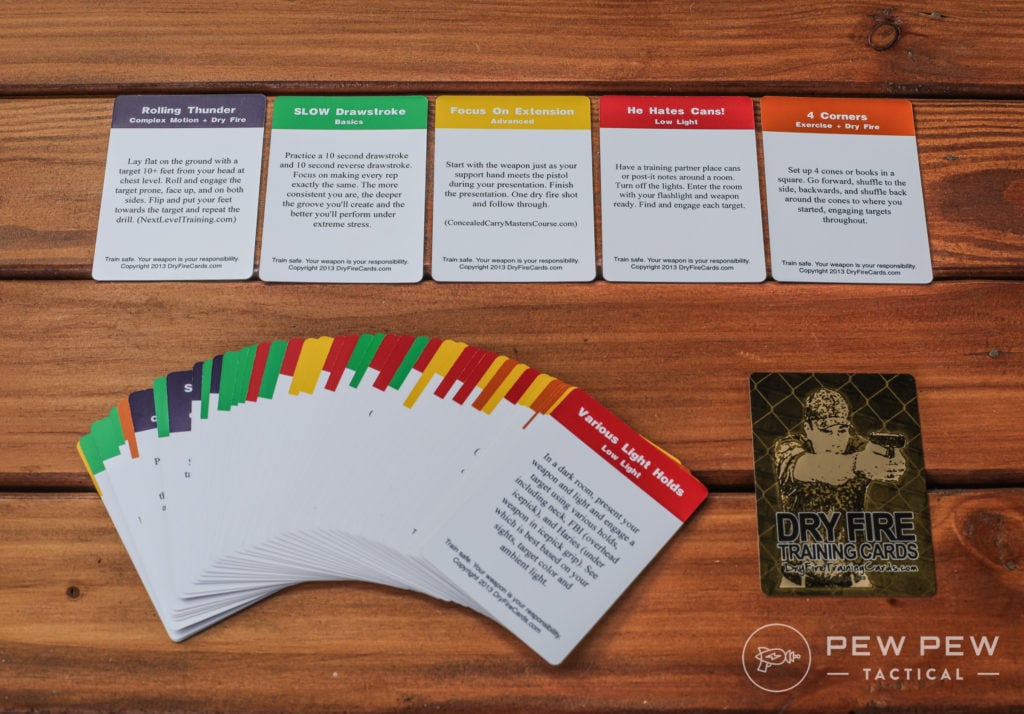
MantisX: Now we’re going hi-tech! This training module attaches to your front rail and gives feedback to your phone through Bluetooth.
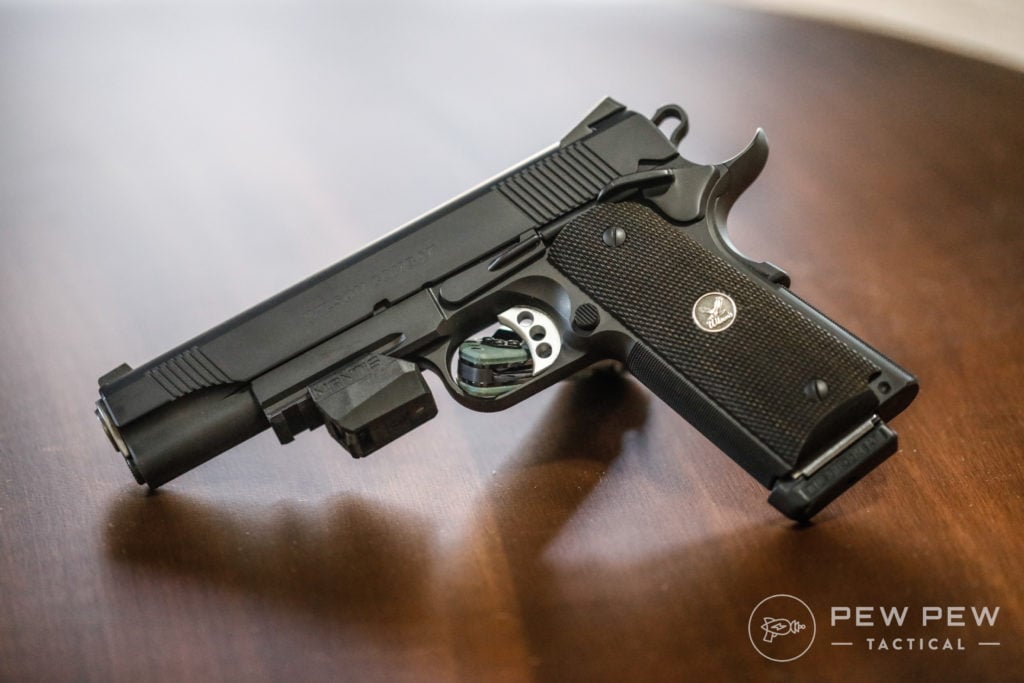
I’ve had my hands on one for a few months and it’s definitely much better than simply looking at if your front sight moved when dry-firing. Instead of simply feeling like you messed up…it tells you where it moved, how much it moved, and how to correct it.
Prices accurate at time of writing
Prices accurate at time of writing
-
25% off all OAKLEY products - OAKLEY25
Copied! Visit Merchant
Full review HERE.
I’d say if you’re really serious about upping your shooting game…try it out. It works with both dry and live fire. Plus, it’s fun to compete with your friends.
Conclusion
And that’s it…now you’ll be able to work on your fundamentals, dry-firing, and range shooting to become a more accurate pistol shooter. Remember, you won’t become a pro in a few days.
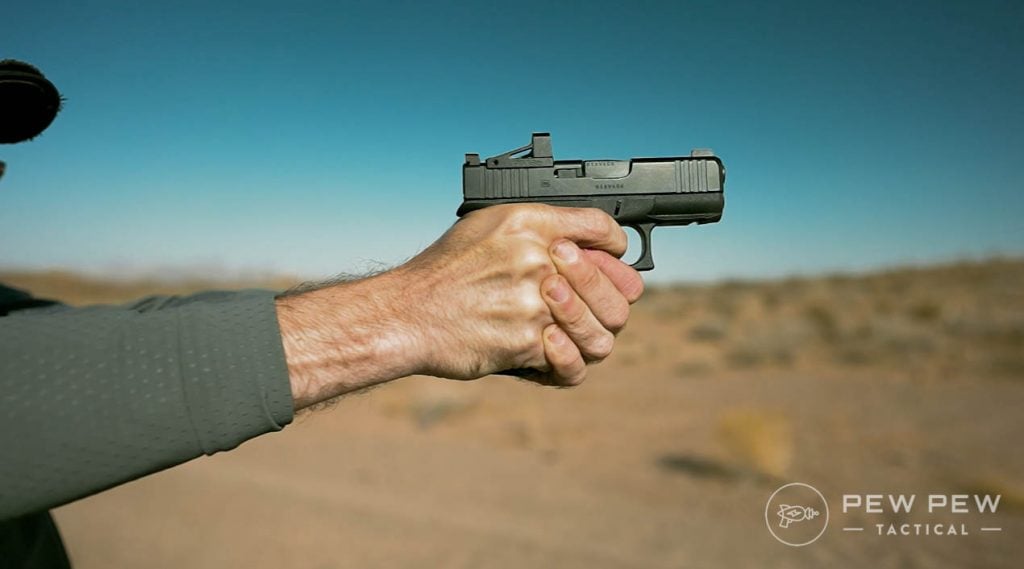
The guy next to you at the range nailing all the steel targets probably has dozens of hours of dry firing and thousands of rounds under his belt.
And in case we didn’t say it enough…don’t do this!

What things helped you learn to shoot better? Let us know in the comments below! If you’re looking for some handgun training…check out our Gun Noob to Gun Slinger program. All the important stuff to get you competent in 2 hours!
LATEST UPDATES
June 22, 2024 – Additional info/pictures.

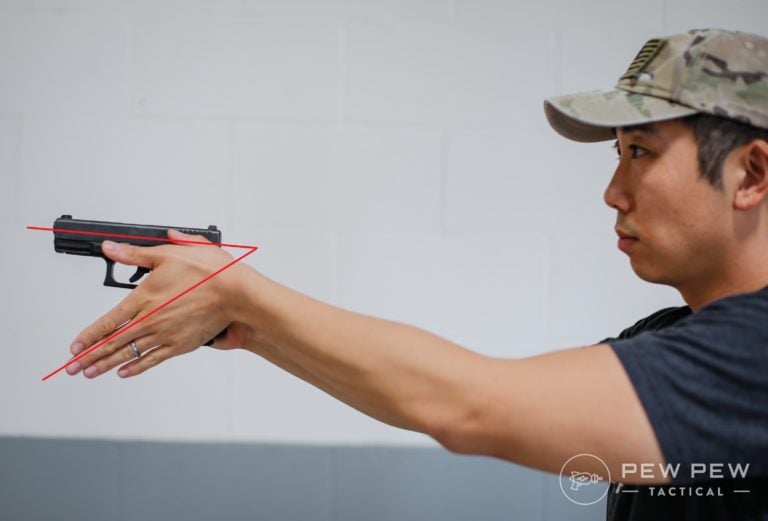
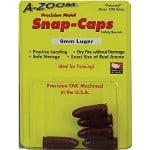










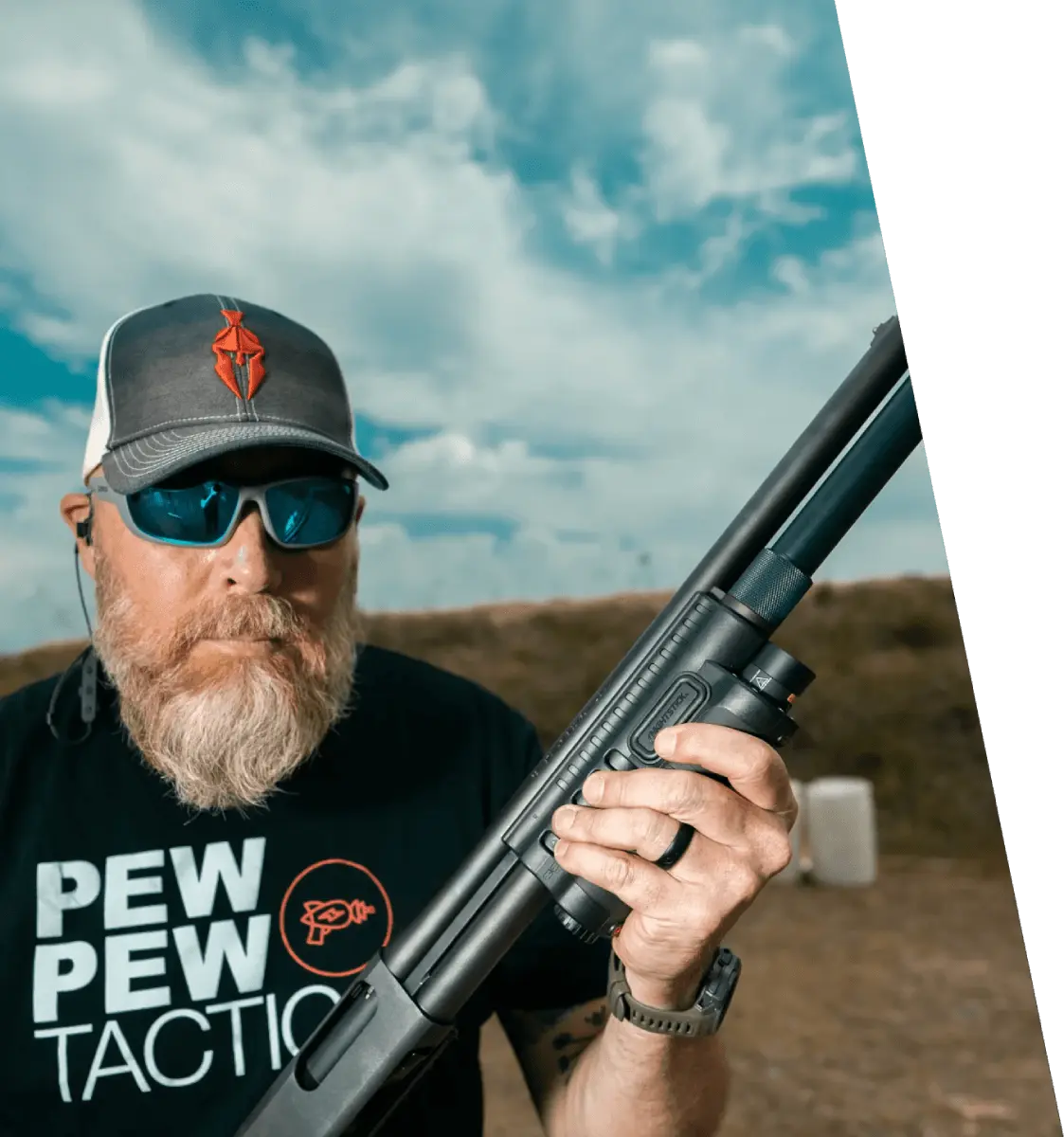

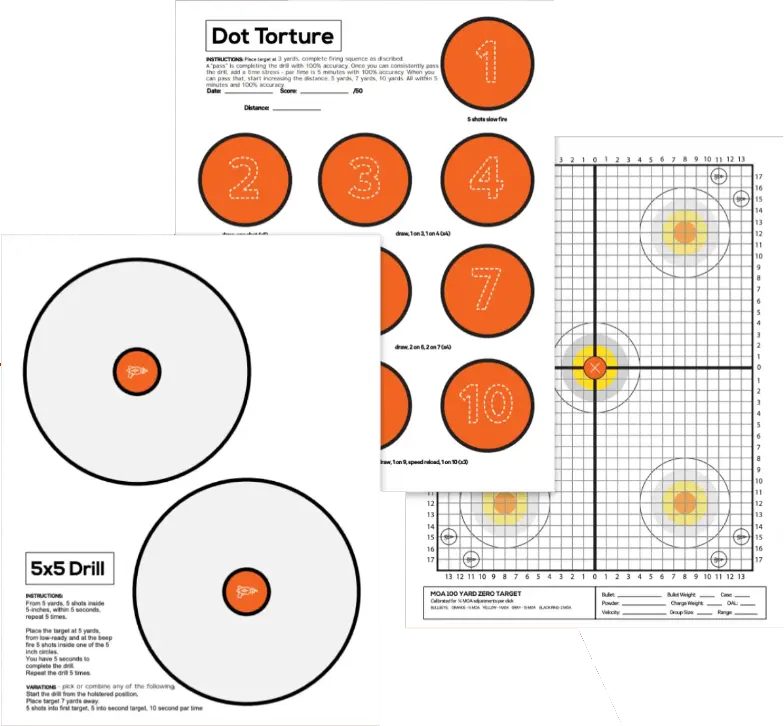
121 Leave a Reply
Excellent information and glad I joined you guys.
W/ Jeff Radin. Eric I sure would like to see an article on various pistol and bb pellet guns. I feel they would really help on accuracy, and one could use them in their basement or back yard at any time they wish. I know it's not a substitute for range time. However many shooters live in the city and just getting to a range is a time commitment.
Hey Jim, thanks for the comment! We have a couple articles on the books regarding air pistol and bb guns but they are old. https://www.pewpewtactical.com/best-bb-guns/ and https://www.pewpewtactical.com/airgun-bb-gun-training/ But thanks to your comment, I will get these put in the To Update ASAP pile!
everyone (almost) harps on stance. except adam pianchaud of sig academy and i. stance can help with followup shots but it is miniscule compared to sight picture and trigger control. i practice shooting on 1 foot. i practice sitting, walking and laying down to prepare for a bad reality situations. i can always do a 2"-3" group at 3, 5 and usually also7 yards ( the realistic self defense distances). stance is just not that important!
Eric, thanks for the tips. I am brand new to the shooting sport family, using a weapon. I have been shooting a camera for over 50 years and some of the same skills are required, breath control, gentle at the shutter release/trigger pull, and composition/target acquisition. I have just purchased a Sig P320 9mm, I pick it up in a week, California rules. I have two P320 M17 pellet guns, one with red dot, one without, which I can practice with at home on a path alongside our house, up to 15 meters long. I use Shoot' N' C targets. I find starting close to the target and using my camera tripod as a support is helpful, particularly when trying to "zero" the red dot sight. Thanks for the detailed guidance.
Jeff
Reflectors are awesome laser targets! When you hit one you know it. Also a laser travels in a straight line....bullets do not. So don't rely on it for more than trigger training.
Thank you for your training information and videos. I’m 73 with childhood memories of my father teaching us gun safety. I had a 20 gauge to start at 10, moved up to 16 and began shooting my mothers 22 rifle soon after, but never had handgun/pistol training. I’m excited to purchase my first pistol in the future and go back over this material as I dry fire (never heard this before) and start to get into target practice. Thanks so much
Is there a rail light that would help me see my hits at the range?
It's been over 55 years since I fired a real weapon. Started with the M 14 16 60 then 50 cal. Training with the 45 was relatively short. Couldn't remember much but after reading your article it really helped. My grandsons have been shooting pump and breakdown rifles for a very long time. My training with rifles were extensive so teaching them safety and techniques were easy. Bought a Co 2 pistol for them to target practice and drew a blank about how to teach them anything. Your article was spot on. Downloaded some targets offered and can't wait to watch them shoot. The Chapman shooting stance worked great for me. Thanks
Old Ray Chapman, he lived up the hill from me and we became pool shooting drinking buddies, what a calm modest pleasant gentleman, sadly he died of a minor surgery mishap, i miss him
You have a pretty good program for teaching fundamentals. I agree with most od what is taught. I am right handed left eyed. I shoot isosceles but face the target and align the sights with my line of sight. I don't adjust my stance to accommodate. I also advocate a straight wrist for the support hand. A straight grip enhances strength and a bent wrist decreases grip strength. Overall, you present a good program. I have been an instructor for 50 years as well as a PPC competition shooter. Take care.
what i see people doing wrong is having there arms strait out locked, the problem with that is your upper body is taking the recoil, lots of movement, bend your elbows slightly and use them as a shock absorber, your arms will take the recoil making your 2nd shot easier
Hi. I read an article a while back by Kyle Lamb that mentioned putting pressure between your thumb and middle finger to free up your trigger finger. This definitely works to keep you from pulling your shots. After I did this I reset my sights to center on my pistols as I had been pulling my shots and didn't realize it.
All I can say is WOW, great info. Thank you for putting this out there. I know there are lots of sites that offer stuff like this and everyone has their own opinions of how to do things, but for me you can never have too much info or training tips. All it takes is one new tip or trick and the read was worth the time. Thanks again
Great important information. Love that instructions are clear to understand. Much appreciated.
Good info. My instuctor is very advanced and doesn't realize some of the details people new to guns need.
Thanks so much!
Lots of good nuggets in this mine of munitions!
I have recently gotten back into shooting. Something I never did, even when qualifying in the USMC, was to release the trigger only to its reset. I always, and always have, fully reset the trigger.
Next range session will include practice on releasing the trigger only to the reset point.
Thanks for this!
Doesn't makes much sense. Looking at slow-mo videos of the pros, they are just releasing the finger naturally. Controlling precise release puts too much tension and focus on what is unnecessary, excessive. Here is an example: facebook_._com/watch/?v=1065852504084065
Amazing! I consider myself an experienced shooter with 50+ years of exposure. Having competed in many national and international events, acquired bronze medal 1980 muzzle loading worldchampionship and numerous first places in Europe.
Still learned to refresh and improve old worn-out habits here!! Also appreciate very much the clear, concise and organised approach as to "how to be a better shot" as presented here by PewPew
Thank you. I'm new at handguns and am reading alot and now shooting alot. Your advice it great.
ive been going to the range for awhile now ive shot 9mm,.44 magnum,Desert Eagle .50 cal Action Express and recently ive been shooting the Heckler and Koch USP .45 today i was shooting i think my problem is shooting too fast all my shots go off to the right i can not hit the center bullseye to save my life.i come close to the bullseye and have some nice groupings i do need to have more practice .could you tell me what i need to do to remedy this problem.
Never too old to learn!
Trying not to get complacent and sloppy!
ty
buy canik at rowe ammo nation . com
Excellent article for me!! Thank you.
Beginning "retraining" in June with a professional trainer on a local range, since I haven't practiced in years, and this helped rekindle a lot of pointers that vanished over time. Had no idea there was such a thing as Snap Caps, etc., to help. Your advice and info was valuable. Thanks.
Placing a coin on top of the rear sight accomplishes the same goal as putting the coin on the front sight with the added bonus of helping with sight alignment.
Thank you very much for your time. To share your knowledge, thank you. I haven't fired a pistol in twenty years. I just bought a Beretta px4 9mm. Compact. I haven't shot it yet ; l am on a fixed income. Year from now, l want a 45. Thank you .
You made a good point when you shared that it is great to develop muscle memory in order to consistently produce excellent trigger pulls. My uncle just mentioned the other day that he is planning to get himself a concealed carry as he wants to protect himself, as well as his family. I will suggest to him getting the permit from a reliable service before he can purchase one.
Eric
Thank you for your article and referencing the Mantis X. I will review and possibly pick one up. It seems to be an excellent tool.
They are a great tool and allow you to practice many fundamentals inexpensively.
Very good information! I’m a recent “range goer” and found I have developed a few of the above mentioned bad habits that I need to break. The dry firing (I was told you shouldn’t shoot without ammo) is going to be a lifesaver! Thank you!
I just saw a suggestion for you to move to Rumble. I hope you do.
Excellent especially for newer pistol shooters. Love the graphics....very helpful
Great stuff Eric. Looking forward to more
Thank you Eric this was very helpful.
Thank you!
Thanks Eric! Great stuff.
Hi Eric
Thanks for your awesome articles.
I was wondering if you would consider posting your videos on Rumble.com as well as youtube, not everyone is staying on youtube.
Many people are switching to Rumble and we'd love to follow you on Rumble.
Thanks.
Hi Eric, excellent info. I can’t thank you enough. Keep up the good work.
Sigs sight differently:
https://www.realgunreviews.com/sig-sauer-sight-heights-sight-numbers/
Great article and good guide for beginners!
One comment on this line:
"The top and middle of the front post is where your rounds should end up…not the actual front dot."
While that's true for sights configured for center hold, many pistols (combat/duty Sigs come to mind) have sights factory set for a different sight picture. For example, my fn fnx45 came from the factory with fixed sights set for combat hold (front dot = point of impact) @ 20 yards.
Anyways, my point is that one should check their manual/research what the factory sights are set for so they are not surprised if they end up shooting a bit low using a center hold.
Otherwise, great guide. Thank you!
Eric, thank you, for this very helpful article. My body had naturally defaulted to the Chapman stance to compensate for my being left-eye dominant yet right-handed. You've confirmed the correct stance to suit my needs so I can be more confident when I practice that I'm doing things properly. Bonus, now I know what to call the stance! God bless you, Sir.
Here's what I did to cure a flinch when shooting full power Glock etc. Buy a .22LR revolver for practice. Dry fire practicing with the long, heavy trigger pull makes semi-auto trigger easy by comparison. Be sure to use snap caps to avoid damage to the gun. Snap caps are expensive, so use 4-6-8x7/8" drywall anchors, which are the same size as .22. At the range, replace half the snap caps with live ammo so you can tell if you're flinching on empty cylinders. Buy bigger snap caps, eg 9mm, to use this same technique in glocks etc.
My .22 revolver is an S&W 63-5, which is steel, but an alloy one might be even better since the lighter weight would be even harder to control.
Great advise! I have a .22LR Ruger Revolver and will try the drywall anchors!
When you did your dry fire review was the G-Sight system considered? If so, what was your analysis?
Nice basic article. I add some things:
1. Don't get too frustrated with your inability to shoot as they do in videos that show rapid fire double tap shooting, remember the pistols they are shooting are NOT stock! They have, at the least, had trigger and spring jobs done on them, which greatly improves their ability to do accurate double taps. Having more tweaking done makes it even easier.
2. Even after a trigger/spring job on my pistol, I continued to struggle with rapid fire accuracy using the isosceles stance. When I signed up with Front Sight, they sent a video to review prior to attendance. They recommend the weaver stance which that change alone immediately improved my accuracy. The grip uses isometric tension; the support hand/arm applies rearward pressure to the firing hand's forward push which helps with recoil control and back on target faster.
3. Another helpful program is the 21 Day Alpha Shooter course - a lot of great tips in there.
4. I would also one other thing I have not seen anywhere but developed on my own: while Dry Firing with your pistol empty or on a snap cap, take a few minutes before practice to just cock the pistol and press the trigger with your eyes CLOSED! Do this several times, it will really help to get you in tune with your trigger.
Good stuff, but one correction - Springfield, at least on certain models, do not recommend dry firing without a snap cap as there is a small roll pin that can break from repeated dry firing. Tikka also recommends a snap cap. Be sure to check your owners manual before repeated dry firing.
I was stupendously fortunate to have a retired Delta Operator teach me how to shoot a pistol. Place the front sight on the target and squeeze the trigger. It is that simple and that difficult.
Sorry sir....you don't wait to hear the trigger reset.
That makes you let the gun dictate when you shoot. Also leads to lesser accuracy
Better to just avoid that.
Better to practice when you are live shooting and take your trigger finger off it let it reset and back to the wall while the gun is cycling.
yes sir
Thank you as a beginner I haven't been able to hit the broad side of a barn I picked up several errors I was committing from your directions
Glad we could help!
Your article on fundamentals of shooting is excellent and a worthy read for new and advanced shooters alike. Thanks for sharing.
Kevin
Glad to help!
Shooting both eyes open... OK, I'm right handed person, I have astigmatism on my right eye, found out that I'm actually a left eye dominant. Still recommend both eyes open?
Yes. I am in the exact same boat! I have a pair of Rudy Project NOYZ with corrective inserts to cover the sight part.
As for the cross eye dominance issue, it simply finding the best solution for you. Personally I spent some time working on retraining my right eye for dominance. Let’s just say I chose to look at alternative options. I started out using the Weaver stance with a almost locked out right arm and turned my head so that I had solid cheek weld on my shoulder. It can work, however you will have to deal with some inherent issues. Movement, sight picture, recoil control.... Now though I have started shooting competition and have move on to a more isosceles stance and combat grip. With the pistol being straight in front of me I only have to tilt/twist my head slightly in order to line up my left eye with the sights. Sometimes I still do a quick wink of my right eye to confirm my sight picture, no big deal. I have found this to be the best answer for me,
Like anything else it takes some practice but it’s worth it.
Im also cross eye dominate, right handed, left eye dominate. I can shoot with either hand although im better right handed. had someone tell me something that helped. try as your sighting, winking your non dominate eye, partially closing it and opening it back up as your aiming, before you squeeze the trigger. it helped me get used to keeping both eyes open. May or may not help you, takes time and pratice. Try it dry fireing first
Great breakdown, and love your sense of humor in the article. Pew Pew has the best staff. Thanks for giving us enthusiests a place to learn more.
Glad you enjoyed it! Thanks for the support.
Your statement on shooting with both eyes open are so true. That’s how I’ve been shooting forever. I finally went to a class to get my carry permit and the instructor specifically said to close one eye. I questioned her because I thought I misunderstood but she said yes. She gave some explanation as to why but I was so surprised an NRA licensed instructor, would give that advice but I started listening closer to see if she gave more erroneous advice...and she did, but I passed the written test despite the wrong advice and scored 100% on the range test...with BOTH EYES OPEN.
I find it much easier for target acquisition and peripheral vision. Thanks for the knowledge you share.
Thank God I have never had to draw my weapon. i've been told by people that would know that when your in the situation with the adrenaline flowing that it may not be possible to close one of your eyes. Also like he said in the article situational awareness is not nearly as good with half of your field of vision cut off
in my younger days I could shoot a rile dead center at 100yards. I could shoo a s&w model 686 357 pretty good to. but in 1995 I was hit from the rear by and oil company truck. now my nerves aren't as good as they used to be. I have ruger vaquero. s&w model 60. I love to shoot still. I am getting older now and things are a bit different than it used to be. I love handguns. you have some great advice. I guess I developed my way of shooting years ago. I was county boy who hunted or food. love to hear more about shooting. johnny joyner
Found this sight just looking for answers on gun terms in articles I was reading and signed up for emails and have learned so much in two days. Appreciate the knowledge and openess to share with others. Buying a 9mm tomorrow and so looking forward to learning how to handle it correctly. Thanks, Mike
Real glad we could help out! Have fun and stay safe with your new pistol!
Hello Eric ...
New shooter here. Interesting/good article above. Do you have anything similar for shotgun shooting ... Mossberg, 00 buckshot?
Hi Mitchell, thanks! We don't have one as in-depth for shotguns...but it's something we're going to add to our editorial calendar.
The other day, a raccoon came after my dog, then me. I fired an DX .40 three times, and all three times the shots went center, low, about 6 o clock. I went to the loods and repeated what happened, and I got exactly the same result. All 3 shots in less than a second, and all 3 pieces of brass landed in a bout a foot circle. Two hits were about 14" apart, and I was running while shooting.. Any suggestions?
Don’t run and shoot silly you’re not a SEAL and raccoons aren’t the taliban lol.
Re: Dominant Eye. The easiest way to determine dominant eye is to point at something, both eyes open, with your finger. Then close one eye. If you're still pointing at the target, that's your dominant eye; if not, it's the other one.
It’s better to use a two-hand pointing method to rule out hand dominance interference and muscle memory bias.
I learned by making a triangle with my two hands and encapsulating a target. Same thing, close one eye at a time and the one that has clear view is the dominant
Training with frank Garcia, 3 time world champ at universal shooting academy. Have shot 50,000 rounds in five months. That’s how you learn to become an elite shooter. Learn right from the best in the beginning.
The bonus target signup link above ain’t working. Thanks
This is a very interesting article. Sometimes you forget to do everything right. Good stance grip trigger pull. My
Problems are some vision issues. I love to shoot don't have enough range time.
Thank you
Another thing I would like to add about the grip is that your off hand is more important than your strong hand. I know it seems counter intuitive but it makes sense when you look at it scientifically. When you grip a gun, you are holding it exclusively with friction. When you tighten your strong hand you are increasing the friction of your strong hand on your gun. When you tighten your weak hand, you are increasing the friction of your weak hand on your strong hand, but also pressing your strong hand against the gun more increasing that too. So tightening your weak hand is actually twice as effective!
As for letting the gun surprise you, that 100% the best advice you can give someone as its the #1 way I see new people screw up pistol shooting. The best metric to learn that, however, is to watch for a muzzle flash. If you see one, then the gun went off without you ready, so no flinch. If you dont see one, then you knew it was coming and reacted by closing your eyes and flinching.
Love your articles. Being new with guns since February I have been doing a lot of dry practicing between live fire and it has made me a much better shooter. I also use the MantisX and have seen my average go from 87% to consistently shooting in the high 94% to low 95%. I'm known as rcjohns322 and my wife who shoots better than I do is shooter361. What are you known by? Keep up the great articles and thank you for taking the time to do it .
BTW Eric, we shoot with ASPDryfire and Glock shooters
Awesome articles Eric! A guy at the range I go to recommended you to me , so glad he did !! I look forward to reading your info
Been carrying for two years, S&W 45 3.3" barrel. Shooting 1.5" groups of 6 from 5 yards out to 10 yards what can I do to tighten my groups? Self trained,, round is 230 grain FMJ... modified gun with a Apex flat trigger and tactical trigger enhancement.
If you can shoot 1.5" groups at center mass when under pressure, do not worry, they are plenty tight.
I’m a beginner and I’m learning so much from your articles. Thank you for caring enough to take the time
Thanks eric!! I always learn or recall things when I read your articles. A few gun magazines need to hire you and give us all a fresh perspective as opposed to the same writers giving us the same deal i read in their mags back in the 70s.
You're so welcome Mike...and you're too kind!
Great job as always! I recommend your site in each class now. You’re really doing a good service with your programs.
Thanks so much, Monte!
Thank you Eric! I discovered you a couple of months ago. Unfortunately like many I spend more time on the internet reading about shooting, watching videos fondling and cleaning my firearms etc. than actually shooting guns, There is a lot of material out there some great but some ridiculously bad. Your articles are always on topics that interest me and knowledgeable and well written. I’m 64 and have been shooting since I earned my marksmanship merit badge in Boy Scouts, Remington .22 nylon 66 I believe. Thanks again; I enjoy your work.
So glad I could help, Jack!
Thank you for this great refresher. It has been many, many, years since I last shot a weapon. But the times are ripe for gearing up.
Great job. Excellent reading. Not the usual boring articles about guns.
I just shot my xds 9mm for the first time today, I put 100 rounds down range in about an hour or so at 50 yards and I got the paper about 20 times and hit the target about 3 or 4 times. I tried really hard to focus but I tended to land on the paper the first few shots, but the more I focused on trying to hit I didn't even know where my bullet was landing. I could hear it hitting the back plate which is good, but I'm clueless where to start. The first shot was nuts so much adrenaline lol, I knew it would be loud but I didn't expect the concussion wave. I learned quickly to not keep my head in the both. Thanks for the tips I'm studying hard to understand and get better.
Alex D you need a spotter. How can you get better if you have no idea where you are shooting? Buy a cheap spotting scope or binoculars, and have a friend spot for you. Also, as this great article says take your time. 100 rounds down range in 1 hour does not sound like a lot, but if your adrenaline was kicking in, and maybe some frustration then I am not surprised the first shots were the best. Anything that gets you worked up and your "blood pumping" is going to make it hard to be accurate. Have you ever hunted before? If so, think about a big 10 pointer walking out of the woods 75 yards off and your in the stand. The it is right after sundown (before the 30 minute mark), and you have very little light. If that does not get your adrenaline kicking in nothing will. In that scieno and at the range it best to try and calm yourself before taking another shot. Remember adrenaline is not your friend when it comes to shooting. Plus were you shooting quick burst or spacing out the shots pretty evenly? As the temperature of the barrel raises it will start to expand once p which results in lose of accuracy. That is why many refiles and and some pistols have a bull barrel. Lastly, you stated the more you try to focus the worse you got. This is one of my greatest weakness. I tend to over think things. Believe it or not you can overthink shooting just like so many other things. Next time you shot think about how you will take the shot. before taking it. This will put your mind at ease before taking the shot The more you practice the more the shot becomes second nature.. Lastly, I have been known to hold the gun pointed down range with the safety on to see if I am puling the trigger. This allows me to see if the gun is pulling left, right, up, or down. This is a great article and I hope I helped some Alex D
Alex, DO NOT put so much into holding on the bull without moving. Anytime your sight moves close the bull squeeze your trigger. You have that split second from the time your brain says squeeze, till you squeeze, and the bullet leaves the barrel you may just be dead on. If you squeeze when on the bull, till you finish and the bullet leaves the barrel you are no longer on the bull.
Nicely done.
Thank You!
Did someone say, ‘If your handgun/pistol shoots centerfire rounds (9mm, .40 S&W, .45 ACP, etc) instead of rimfire rounds (such as .22 LR), then you can dry fire all you want since the firing pin is not actually hitting anything.’
Ahh, ... no you cannot!
In fact Glock, Inc./GmbH is now telling customers not to dry-fire their Glocks without using snap caps. As for the particular comment about ‘not actually hitting anything’? Every time a Glock is dry-fired the front of the striker slams into the back of the breech face. (Which, probably, explains the reason for all of those lovely pictures showing Glock slides with punched-out breech faces that have been circulating around the internet for many years, now.)
I’ll, also, offer two personal observations about proper grip and stance: (Yes, for the past 25 years I’ve been a multi-certified Firearms Instructor; so I think it’s safe for me to speak up on this topic.) Yes, the isosceles stance tends to be highly intuitive; and it does aid many shooters to hit COM at fairly close range (say at and inside 8 to 10 yards); but, at the same time, the shooter should be wearing a vest because, in particular, an isosceles stance demands a shooter to use frontal protection.
Because a pistol shooter can’t really ‘roll (and lock) his wrists’, or take the (accuracy destroying) tension off the tendons in the upper part of his forearms by relaxing his elbows, the isosceles is not an ideal stance to use on farther targets (say at and beyond 12 to 15 yards).
It’s, probably, gone unnoticed by the world-at-large; but, the last time I checked neither: Leatham, Enos, or Middlebrooks were using any of the aforementioned (and admittedly) popular: Isosceles, Weaver, and Modified Weaver (or Chapman) stances. All three of these stances are, now widely considered to be, ‘yesterday’s news’; and, quite frankly, I have to agree.
The best (repetitive) pistol shooting I have ever done in my entire life occurred while I was using the ‘Reverse Chapman’ grip and stance. It’s more natural for the body to assume; there’s less stress on the body’s skeletal structure—especially in the forearms and wrists— and, with a proper ‘rolled over’ grip controllability over the pistol and accuracy go way up! I’ve watched videos of Leatham teaching this stance/grip; and D.R. Middlebrooks markets these techniques as part of his ‘Fist-Fire’ pistol combat course. (Which I happen to think is one of the best combat pistol courses available to both government agencies, and everyday law-abiding civilians to be found anywhere in the world, today.)
One huge advantage to using the ‘Reverse Chapman/Fist-Fire’ grip and stance is that pistol shots will quickly stop impacting the target at the dreaded 6 to 9 o’clock position. (3 to 6 o’clock for a left-handed shooter).
Neither is it necessary for an active competitor who's firing many hundreds of rounds during a course-of-fire to exhaust himself by having to maintain a crushing ‘death grip’ on his pistol. Years ago, now, I remember D.R. Middlebrooks commenting about how he would have had to end his national and worldwide championship shooting career years earlier than he did, if he had not discovered the practical value and virtues of using a ‘Reverse Chapman’ stance and grip. (Which he, of course, modified to suit himself and continue his award winning career.)
As for myself? The ‘Fist-Fire’ stance and grip is all I use, today; and, even at my present (considerable) age, by doing this I’ve managed to attract a lot of favorable comments and attention from other pistoleros who have to know how to ‘run’ a pistol for a living. Anyone who’s interested can get a couple of videos on this technique from the Tactical Shooting Academy in Surry, VA.
NOTE: I've always found Hogue HandAll 'Tactical Grip Sleeves' to be way superior to Talon grips—Which I've often worn out in less than 4 or 5 weeks; but not the Hogue HandAll sleeve. The Hogue grip sleeves can last through a good 8 to 10 months of heavy daily use!
Outstanding article. Very well written and to great depth!
Great web site excellent self help tips! Thanks for the great targets.
Thanks for this great info. I shoot a variety of handguns so will try these tips out to improve my shooting
Great tips! I’m going to work on them.
Thank you.
I,m L-Handed and have had a S@W Shield 9mm for awhile, now I traded the 9mm Shield for the S@W Shield 45ACP. .Here,s my basic proBlem.
95% of the time, I usually hit off to the R-side of the target. Got any idea,s what the basic cause is I,m doing wrong ??
Please send me a few pointers to my E-mail.
No matter what 45 load grain I shoot the problem still exist. I just purchased and mounted the new style ESSIGHT with the larger white dot on front bead. Tks. guy,s.
Hey Alan, you might want to try one of the laser trainers in the article, or have a more accurate buddy shoot to make sure it's not you. Otherwise it could be the sights.
I am a south paw also, with a Shield 9mm. Try this grip modification: imagine a two-foot stick in each hand, held vertical and parallel. Now tilt the top of both sticks towards each other about an inch. Replicate this force in your grip. It helped me pull my shots from the right back to center.
Thanks Eric. I appreciate the tips. I shot expert in the army with several firearms ... 35 years ago. Now I am trying to get back some gunsense and help my wife. This is a good article to share with us newbies.
You're so welcome Steve!
Thanks for something free that is really worthwhile. I am sure that I have read every one of these tips, but not in such a concise and all together format. Thank you very much for taking the time. I will print a hard copy and put it in my range bag for reference. Also thanks for the free targets. My range gets $1.50 each and I am a member.
TDR
Hi TDR, glad we could help out with this article and the targets!
Love your articles. Thanks for the clear, concise and practical information. It helps a newbie like me immensely.
You're so welcome!
Great article. I've been shooting for 50 years and never hurts to read through a good article that helps to reinforce good shooting habits. You're never to old to learn and yes old dogs can learn new tricks.
good stuff the only opposed is the shooter placement wheel to diagnose grip check sob tactical with jhon shriek McVeigh he has a video on YouTube about this
Great article, thank you! I've now read it thru 3 times practicing as I go. So very helpful, but as a newbie I got a bit confused at handgun grip as my new gun is a revolver. I need a lot more practice but love your help in learning more about guns. Thanks again! I'm hooked!
Great article. As an accomplished shooter I am always open to refresher articles and training--just what I needed.
Great article! Im a new shooter and have learned a lot through some practice, articles and videos. on the Shooting Placement Diagnosis image i saw a section that there is no follow-through. can you illustrate/explain is "follow-through' and how to correcty do it?... thanks and god bless
Appreciate very much, i've learned more.
Thank you.
BTW, I prefer articles about glock, glock 19 gen 4 in particular or accessories, or more tips on how to become better.
sweet
Very good informative article for me as a beginner shooter at age 82. Where can I get a hard copy of this?
Hey Stan, awesome to hear! You can probably copy paste and print it out.
Great article, Eric! Lots of very good information.